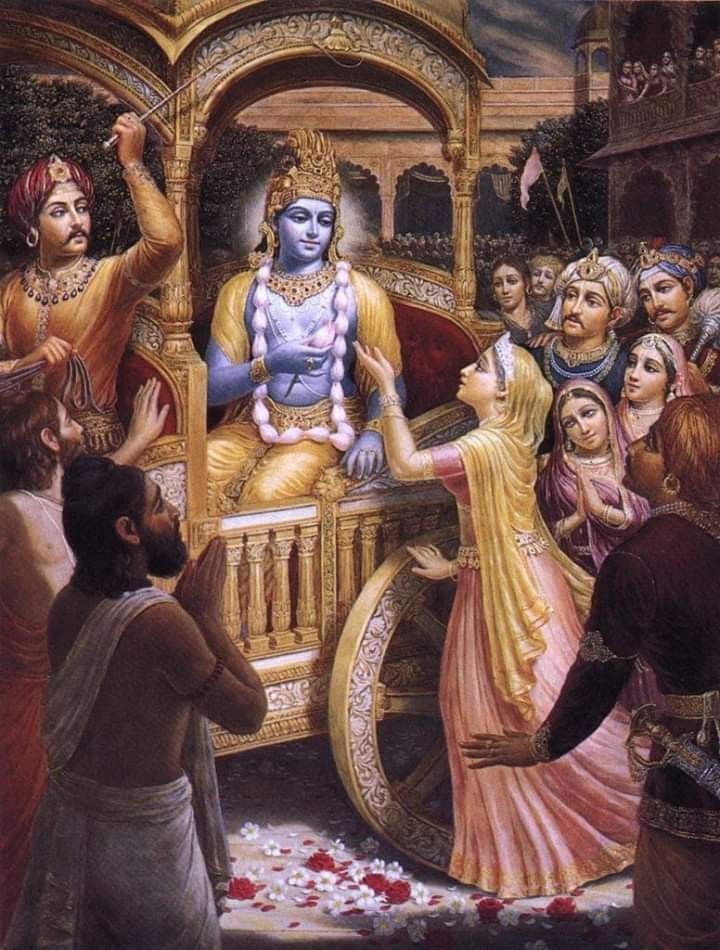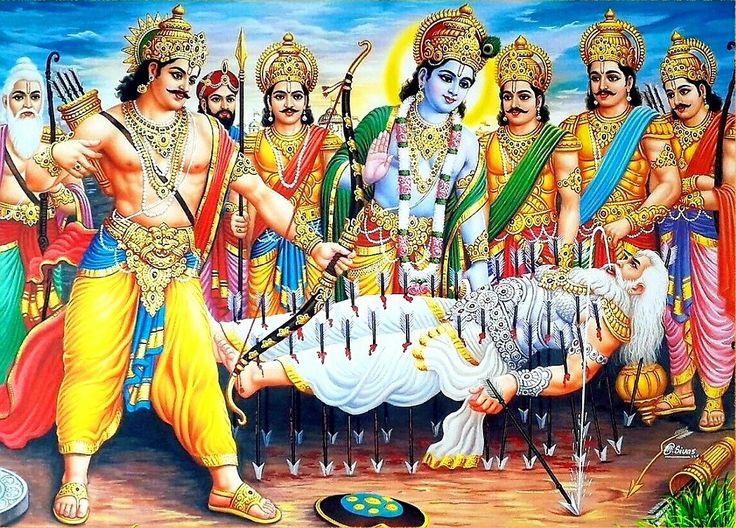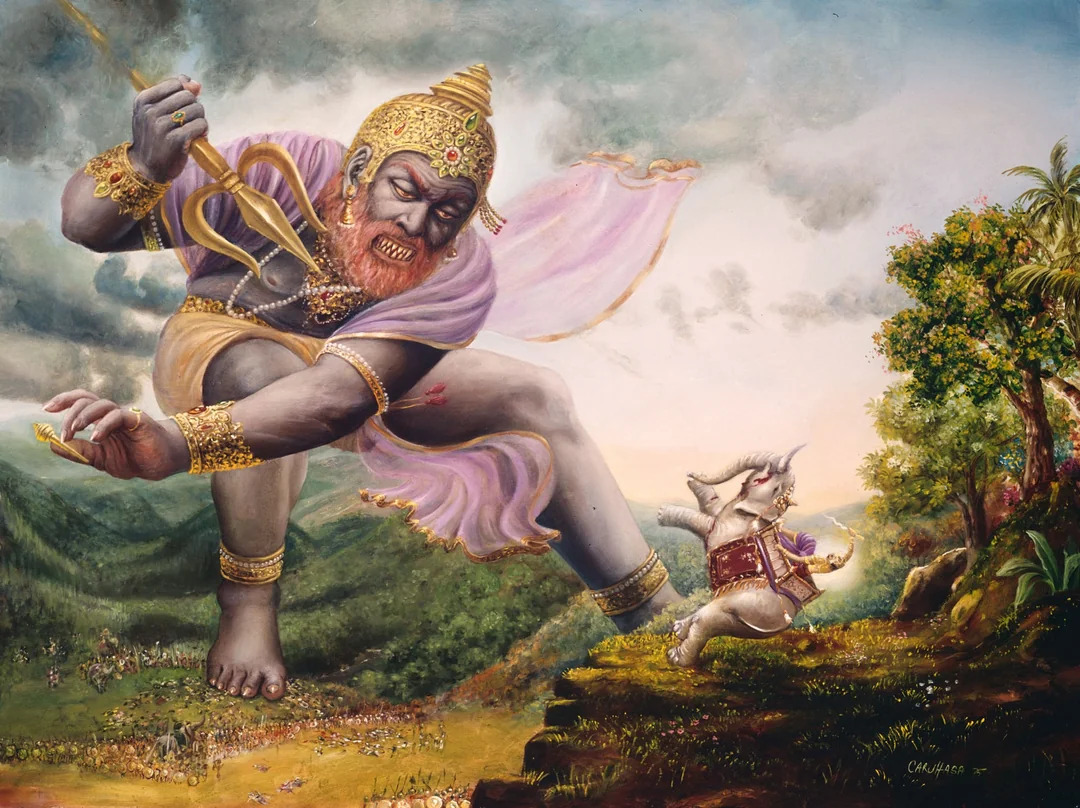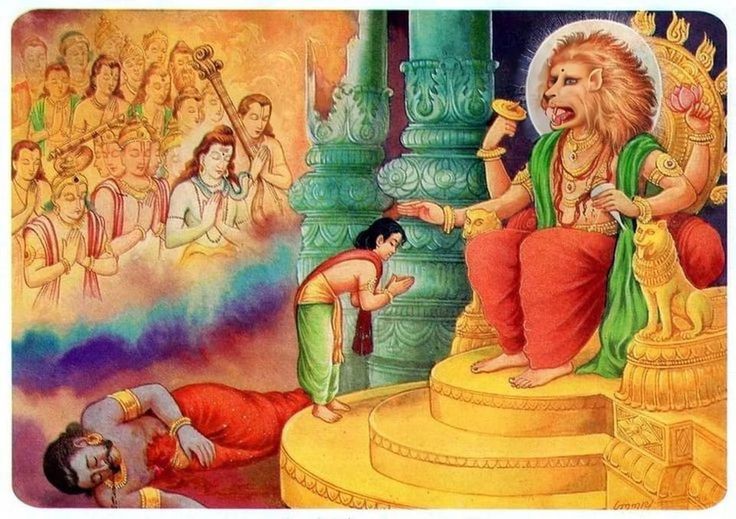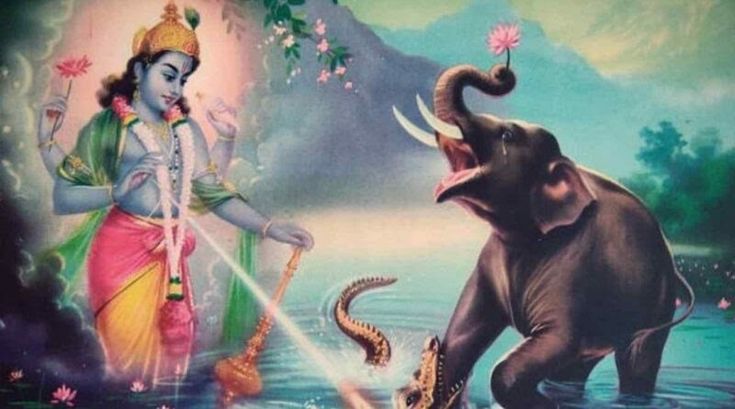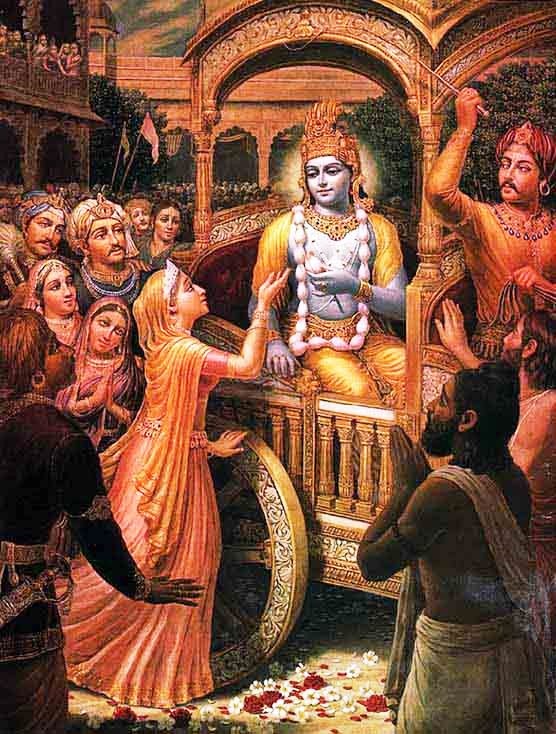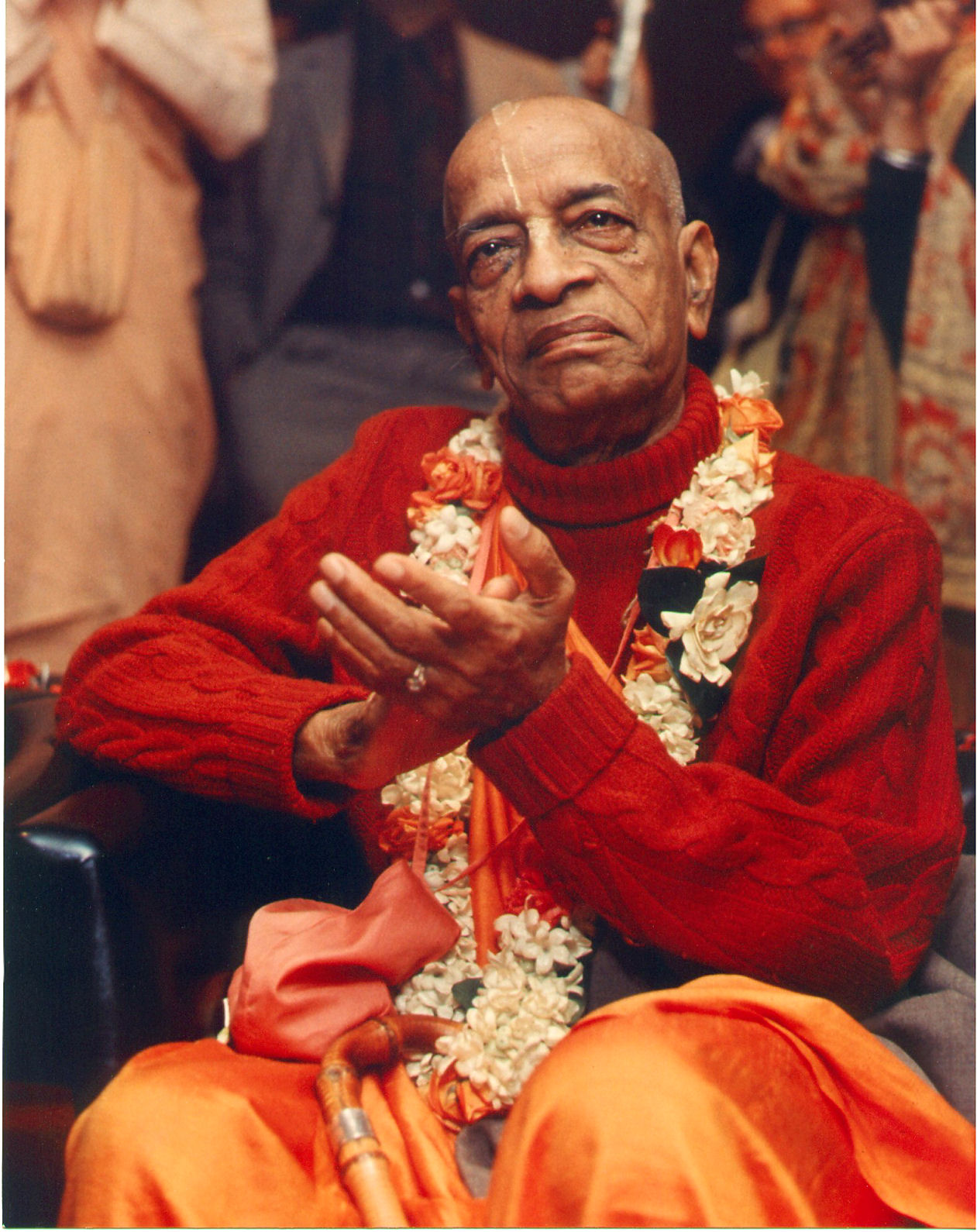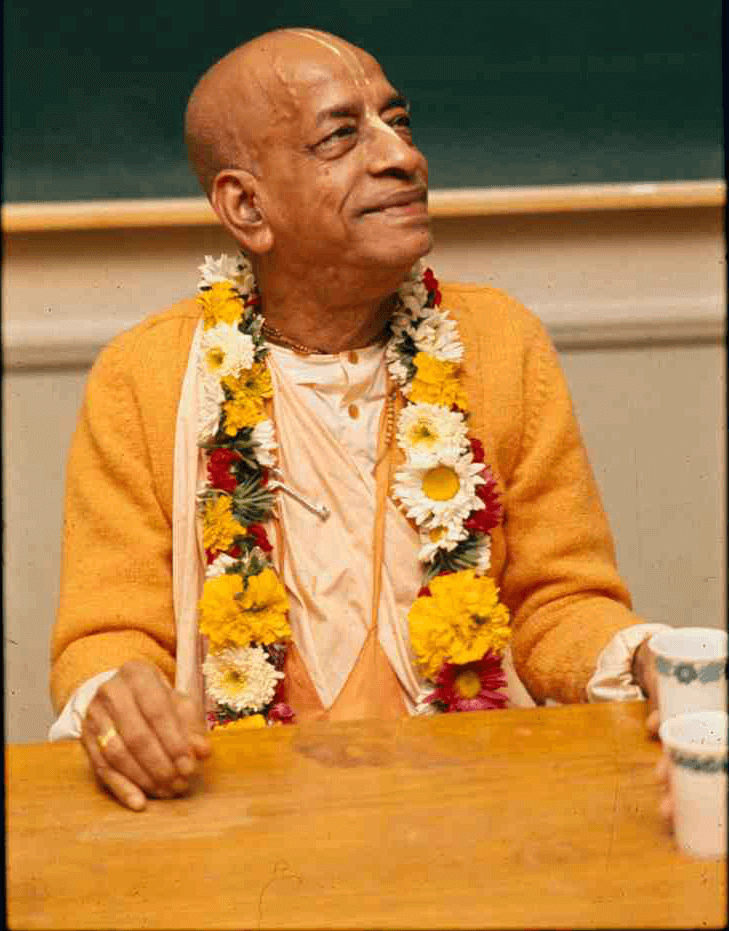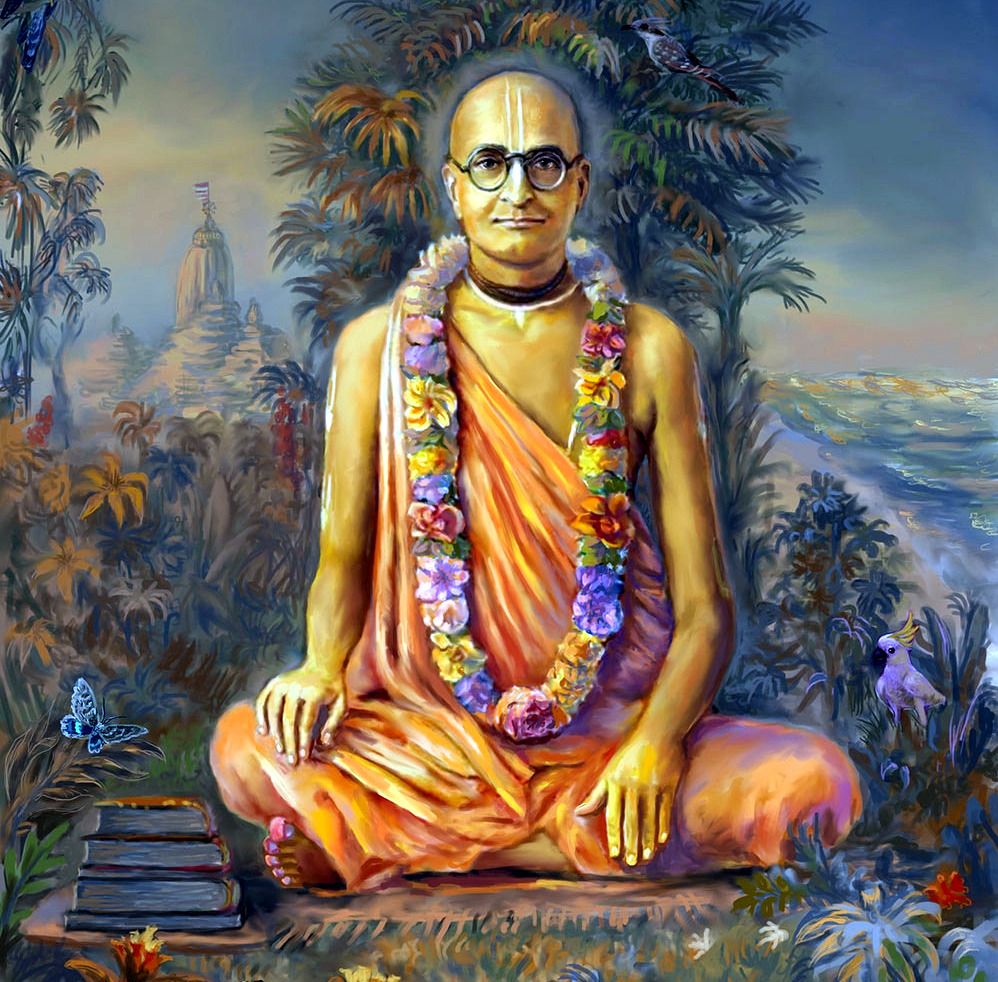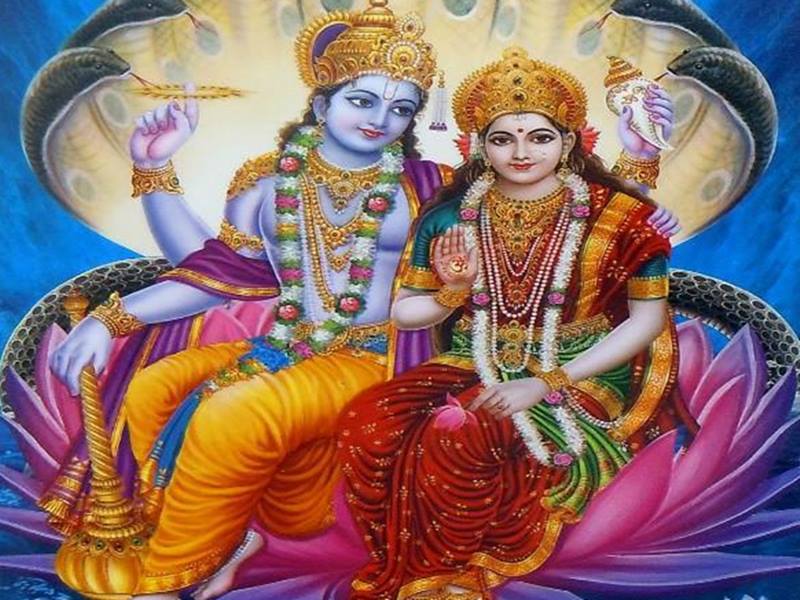Selected Śrīmad-Bhāgavatam Prayers
Prayers by Maharani Kunti (Kunti Stuti)
Prayers by Bhisma
Prayers by Vṛtrāsura
Prayers by Prahlad Maharaj
Prayers by Gajendra (Gajendra-Mokṣa)
Prayers by Maharani Kunti (Kunti Stuti)
कुन्त्युवाच
नमस्ये पुरुषं त्वाद्यमीश्वरं प्रकृते: परम् ।
अलक्ष्यं सर्वभूतानामन्तर्बहिरवस्थितम् ॥ १८ ॥
kunty uvāca
namasye puruṣaṁ tvādyam
īśvaraṁ prakṛteḥ param
alakṣyaṁ sarva-bhūtānām
antar bahir avasthitam
Śrīmatī Kuntī said: O Kṛṣṇa, I offer my obeisances unto You because You are the original personality and are unaffected by the qualities of the material world. You are existing both within and without everything, yet You are invisible to all. (ŚB 1.8.18)
मायाजवनिकाच्छन्नमज्ञाधोक्षजमव्ययम् ।
न लक्ष्यसे मूढदृशा नटो नाट्यधरो यथा ॥ १९ ॥
māyā-javanikācchannam
ajñādhokṣajam avyayam
na lakṣyase mūḍha-dṛśā
naṭo nāṭyadharo yathā
Being beyond the range of limited sense perception, You are the eternally irreproachable factor covered by the curtain of deluding energy. You are invisible to the foolish observer, exactly as an actor dressed as a player is not recognized. (ŚB 1.8.19)
तथा परमहंसानां मुनीनाममलात्मनाम् ।
भक्तियोगविधानार्थं कथं पश्येम हि स्त्रिय: ॥ २० ॥
tathā paramahaṁsānāṁ
munīnām amalātmanām
bhakti-yoga-vidhānārthaṁ
kathaṁ paśyema hi striyaḥ
You Yourself descend to propagate the transcendental science of devotional service unto the hearts of the advanced transcendentalists and mental speculators, who are purified by being able to discriminate between matter and spirit. How then can we women know You perfectly? (ŚB 1.8.20)
कृष्णाय वासुदेवाय देवकीनन्दनाय च ।
नन्दगोपकुमाराय गोविन्दाय नमो नम: ॥ २१ ॥
kṛṣṇāya vāsudevāya
devakī-nandanāya ca
nanda-gopa-kumārāya
govindāya namo namaḥ
Let me therefore offer my respectful obeisances unto the Lord, who has become the son of Vasudeva, the pleasure of Devakī, the boy of Nanda and the other cowherd men of Vṛndāvana, and the enlivener of the cows and the senses. (ŚB 1.8.21)
नम: पङ्कजनाभाय नम: पङ्कजमालिने ।
नम: पङ्कजनेत्राय नमस्ते पङ्कजाङ्घ्रये ॥ २२ ॥
namaḥ paṅkaja-nābhāya
namaḥ paṅkaja-māline
namaḥ paṅkaja-netrāya
namas te paṅkajāṅghraye
My respectful obeisances are unto You, O Lord, whose abdomen is marked with a depression like a lotus flower, who are always decorated with garlands of lotus flowers, whose glance is as cool as the lotus and whose feet are engraved with lotuses. (ŚB 1.8.22)
यथा हृषीकेश खलेन देवकी
कंसेन रुद्धातिचिरं शुचार्पिता ।
विमोचिताहं च सहात्मजा विभो
त्वयैव नाथेन मुहुर्विपद्गणात् ॥ २३ ॥
yathā hṛṣīkeśa khalena devakī
kaṁsena ruddhāticiraṁ śucārpitā
vimocitāhaṁ ca sahātmajā vibho
tvayaiva nāthena muhur vipad-gaṇāt
O Hṛṣīkeśa, master of the senses and Lord of lords, You have released Your mother, Devakī, who was long imprisoned and distressed by the envious King Kaṁsa, and me and my children from a series of constant dangers. (ŚB 1.8.23)
विषान्महाग्ने: पुरुषाददर्शना-
दसत्सभाया वनवासकृच्छ्रत: ।
मृधे मृधेऽनेकमहारथास्त्रतो
द्रौण्यस्त्रतश्चास्म हरेऽभिरक्षिता: ॥ २४ ॥
viṣān mahāgneḥ puruṣāda-darśanād
asat-sabhāyā vana-vāsa-kṛcchrataḥ
mṛdhe mṛdhe ’neka-mahārathāstrato
drauṇy-astrataś cāsma hare ’bhirakṣitāḥ
My dear Kṛṣṇa, Your Lordship has protected us from a poisoned cake, from a great fire, from cannibals, from the vicious assembly, from sufferings during our exile in the forest and from the battle where great generals fought. And now You have saved us from the weapon of Aśvatthāmā. (ŚB 1.8.24)
विपद: सन्तु ता: शश्वत्तत्र तत्र जगद्गुरो ।
भवतो दर्शनं यत्स्यादपुनर्भवदर्शनम् ॥ २५ ॥
vipadaḥ santu tāḥ śaśvat
tatra tatra jagad-guro
bhavato darśanaṁ yat syād
apunar bhava-darśanam
I wish that all those calamities would happen again and again so that we could see You again and again, for seeing You means that we will no longer see repeated births and deaths. (ŚB 1.8.25)
जन्मैश्वर्यश्रुतश्रीभिरेधमानमद: पुमान् ।
नैवार्हत्यभिधातुं वै त्वामकिञ्चनगोचरम् ॥ २६ ॥
janmaiśvarya-śruta-śrībhir
edhamāna-madaḥ pumān
naivārhaty abhidhātuṁ vai
tvām akiñcana-gocaram
My Lord, Your Lordship can easily be approached, but only by those who are materially exhausted. One who is on the path of [material] progress, trying to improve himself with respectable parentage, great opulence, high education and bodily beauty, cannot approach You with sincere feeling. (ŚB 1.8.26)
नमोऽकिञ्चनवित्ताय निवृत्तगुणवृत्तये ।
आत्मारामाय शान्ताय कैवल्यपतये नम: ॥ २७ ॥
namo ’kiñcana-vittāya
nivṛtta-guṇa-vṛttaye
ātmārāmāya śāntāya
kaivalya-pataye namaḥ
My obeisances are unto You, who are the property of the materially impoverished. You have nothing to do with the actions and reactions of the material modes of nature. You are self-satisfied, and therefore You are the most gentle and are master of the monists. (ŚB 1.8.27)
मन्ये त्वां कालमीशानमनादिनिधनं विभुम् ।
समं चरन्तं सर्वत्र भूतानां यन्मिथ: कलि: ॥ २८ ॥
manye tvāṁ kālam īśānam
anādi-nidhanaṁ vibhum
samaṁ carantaṁ sarvatra
bhūtānāṁ yan mithaḥ kaliḥ
My Lord, I consider Your Lordship to be eternal time, the supreme controller, without beginning and end, the all-pervasive one. In distributing Your mercy, You are equal to everyone. The dissensions between living beings are due to social intercourse. (ŚB 1.8.28)
न वेद कश्चिद्भगवंश्चिकीर्षितं
तवेहमानस्य नृणां विडम्बनम् ।
न यस्य कश्चिद्दयितोऽस्ति कर्हिचिद्
द्वेष्यश्च यस्मिन् विषमा मतिर्नृणाम् ॥ २९ ॥
na veda kaścid bhagavaṁś cikīrṣitaṁ
tavehamānasya nṛṇāṁ viḍambanam
na yasya kaścid dayito ’sti karhicid
dveṣyaś ca yasmin viṣamā matir nṛṇām
O Lord, no one can understand Your transcendental pastimes, which appear to be human and so are misleading. You have no specific object of favor, nor do You have any object of envy. People only imagine that You are partial. (ŚB 1.8.29)
जन्म कर्म च विश्वात्मन्नजस्याकर्तुरात्मन: ।
तिर्यङ्नृषिषु याद:सु तदत्यन्तविडम्बनम् ॥ ३० ॥
janma karma ca viśvātmann
ajasyākartur ātmanaḥ
tiryaṅ-nṝṣiṣu yādaḥsu
tad atyanta-viḍambanam
Of course it is bewildering, O soul of the universe, that You work, though You are inactive, and that You take birth, though You are the vital force and the unborn. You Yourself descend amongst animals, men, sages and aquatics. Verily, this is bewildering. (ŚB 1.8.30)
गोप्याददे त्वयि कृतागसि दाम तावद्
या ते दशाश्रुकलिलाञ्जनसम्भ्रमाक्षम् ।
वक्त्रं निनीय भयभावनया स्थितस्य
सा मां विमोहयति भीरपि यद्बिभेति ॥ ३१ ॥
gopy ādade tvayi kṛtāgasi dāma tāvad
yā te daśāśru-kalilāñjana-sambhramākṣam
vaktraṁ ninīya bhaya-bhāvanayā sthitasya
sā māṁ vimohayati bhīr api yad bibheti
My dear Kṛṣṇa, Yaśodā took up a rope to bind You when You committed an offense, and Your perturbed eyes overflooded with tears, which washed the mascara from Your eyes. And You were afraid, though fear personified is afraid of You. This sight is bewildering to me. (ŚB 1.8.31)
केचिदाहुरजं जातं पुण्यश्लोकस्य कीर्तये ।
यदो: प्रियस्यान्ववाये मलयस्येव चन्दनम् ॥ ३२ ॥
kecid āhur ajaṁ jātaṁ
puṇya-ślokasya kīrtaye
yadoḥ priyasyānvavāye
malayasyeva candanam
Some say that the Unborn is born for the glorification of pious kings, and others say that He is born to please King Yadu, one of Your dearest devotees. You appear in his family as sandalwood appears in the Malaya hills. (ŚB 1.8.32)
अपरे वसुदेवस्य देवक्यां याचितोऽभ्यगात् ।
अजस्त्वमस्य क्षेमाय वधाय च सुरद्विषाम् ॥ ३३ ॥
apare vasudevasya
devakyāṁ yācito ’bhyagāt
ajas tvam asya kṣemāya
vadhāya ca sura-dviṣām
Others say that since both Vasudeva and Devakī prayed for You, You have taken Your birth as their son. Undoubtedly You are unborn, yet You take Your birth for their welfare and to kill those who are envious of the demigods. (ŚB 1.8.33)
भारावतारणायान्ये भुवो नाव इवोदधौ ।
सीदन्त्या भूरिभारेण जातो ह्यात्मभुवार्थित: ॥ ३४ ॥
bhārāvatāraṇāyānye
bhuvo nāva ivodadhau
sīdantyā bhūri-bhāreṇa
jāto hy ātma-bhuvārthitaḥ
Others say that the world, being overburdened like a boat at sea, is much aggrieved, and that Brahmā, who is Your son, prayed for You, and so You have appeared to diminish the trouble. (ŚB 1.8.34)
भवेऽस्मिन् क्लिश्यमानानामविद्याकामकर्मभि: ।
श्रवणस्मरणार्हाणि करिष्यन्निति केचन ॥ ३५ ॥
bhave ’smin kliśyamānānām
avidyā-kāma-karmabhiḥ
śravaṇa-smaraṇārhāṇi
kariṣyann iti kecana
And yet others say that You appeared for the sake of rejuvenating the devotional service of hearing, remembering, worshiping and so on in order that the conditioned souls suffering from material pangs might take advantage and gain liberation. (ŚB 1.8.35)
शृण्वन्ति गायन्ति गृणन्त्यभीक्ष्णश:
स्मरन्ति नन्दन्ति तवेहितं जना: ।
त एव पश्यन्त्यचिरेण तावकं
भवप्रवाहोपरमं पदाम्बुजम् ॥ ३६ ॥
śṛṇvanti gāyanti gṛṇanty abhīkṣṇaśaḥ
smaranti nandanti tavehitaṁ janāḥ
ta eva paśyanty acireṇa tāvakaṁ
bhava-pravāhoparamaṁ padāmbujam
O Kṛṣṇa, those who continuously hear, chant and repeat Your transcendental activities, or take pleasure in others’ doing so, certainly see Your lotus feet, which alone can stop the repetition of birth and death. (ŚB 1.8.36)
अप्यद्य नस्त्वं स्वकृतेहित प्रभो
जिहाससि स्वित्सुहृदोऽनुजीविन: ।
येषां न चान्यद्भवत: पदाम्बुजात्
परायणं राजसु योजितांहसाम् ॥ ३७ ॥
apy adya nas tvaṁ sva-kṛtehita prabho
jihāsasi svit suhṛdo ’nujīvinaḥ
yeṣāṁ na cānyad bhavataḥ padāmbujāt
parāyaṇaṁ rājasu yojitāṁhasām
O my Lord, You have executed all duties Yourself. Are you leaving us today, though we are completely dependent on Your mercy and have no one else to protect us, now when all kings are at enmity with us? (ŚB 1.8.37)
के वयं नामरूपाभ्यां यदुभि: सह पाण्डवा: ।
भवतोऽदर्शनं यर्हि हृषीकाणामिवेशितु: ॥ ३८ ॥
ke vayaṁ nāma-rūpābhyāṁ
yadubhiḥ saha pāṇḍavāḥ
bhavato ’darśanaṁ yarhi
hṛṣīkāṇām iveśituḥ
As the name and fame of a particular body is finished with the disappearance of the living spirit, similarly if You do not look upon us, all our fame and activities, along with the Pāṇḍavas and Yadus, will end at once. (ŚB 1.8.38)
नेयं शोभिष्यते तत्र यथेदानीं गदाधर ।
त्वत्पदैरङ्किता भाति स्वलक्षणविलक्षितै: ॥ ३९ ॥
neyaṁ śobhiṣyate tatra
yathedānīṁ gadādhara
tvat-padair aṅkitā bhāti
sva-lakṣaṇa-vilakṣitaiḥ
O Gadādhara [Kṛṣṇa], our kingdom is now being marked by the impressions of Your feet, and therefore it appears beautiful. But when You leave, it will no longer be so. (ŚB 1.8.39)
इमे जनपदा: स्वृद्धा: सुपक्वौषधिवीरुध: ।
वनाद्रिनद्युदन्वन्तो ह्येधन्ते तव वीक्षितै: ॥ ४० ॥
ime jana-padāḥ svṛddhāḥ
supakvauṣadhi-vīrudhaḥ
vanādri-nady-udanvanto
hy edhante tava vīkṣitaiḥ
All these cities and villages are flourishing in all respects because the herbs and grains are in abundance, the trees are full of fruits, the rivers are flowing, the hills are full of minerals and the oceans full of wealth. And this is all due to Your glancing over them. (ŚB 1.8.40)
अथ विश्वेश विश्वात्मन् विश्वमूर्ते स्वकेषु मे ।
स्नेहपाशमिमं छिन्धि दृढं पाण्डुषु वृष्णिषु ॥ ४१ ॥
atha viśveśa viśvātman
viśva-mūrte svakeṣu me
sneha-pāśam imaṁ chindhi
dṛḍhaṁ pāṇḍuṣu vṛṣṇiṣu
O Lord of the universe, soul of the universe, O personality of the form of the universe, please, therefore, sever my tie of affection for my kinsmen, the Pāṇḍavas and the Vṛṣṇis. (ŚB 1.8.41)
त्वयि मेऽनन्यविषया मतिर्मधुपतेऽसकृत् ।
रतिमुद्वहतादद्धा गङ्गेवौघमुदन्वति ॥ ४२ ॥
tvayi me ’nanya-viṣayā
matir madhu-pate ’sakṛt
ratim udvahatād addhā
gaṅgevaugham udanvati
O Lord of Madhu, as the Ganges forever flows to the sea without hindrance, let my attraction be constantly drawn unto You without being diverted to anyone else. (ŚB 1.8.42)
श्रीकृष्ण कृष्णसख वृष्ण्यृषभावनिध्रुग्
राजन्यवंशदहनानपवर्गवीर्य ।
गोविन्द गोद्विजसुरार्तिहरावतार
योगेश्वराखिलगुरो भगवन्नमस्ते ॥ ४३ ॥
śrī-kṛṣṇa kṛṣṇa-sakha vṛṣṇy-ṛṣabhāvani-dhrug-
rājanya-vaṁśa-dahanānapavarga-vīrya
govinda go-dvija-surārti-harāvatāra
yogeśvarākhila-guro bhagavan namas te
O Kṛṣṇa, O friend of Arjuna, O chief amongst the descendants of Vṛṣṇi, You are the destroyer of those political parties which are disturbing elements on this earth. Your prowess never deteriorates. You are the proprietor of the transcendental abode, and You descend to relieve the distresses of the cows, the brāhmaṇas and the devotees. You possess all mystic powers, and You are the preceptor of the entire universe. You are the almighty God, and I offer You my respectful obeisances. (ŚB 1.8.43)Download this Prayer as a PDF
Prayers by Bhisma
श्रीभीष्म उवाच
इति मतिरुपकल्पिता वितृष्णा
भगवति सात्वतपुङ्गवे विभूम्नि ।
स्वसुखमुपगते क्वचिद्विहर्तुं
प्रकृतिमुपेयुषि यद्भवप्रवाह: ॥ ३२ ॥
śrī-bhīṣma uvāca
iti matir upakalpitā vitṛṣṇā
bhagavati sātvata-puṅgave vibhūmni
sva-sukham upagate kvacid vihartuṁ
prakṛtim upeyuṣi yad-bhava-pravāhaḥ
Bhīṣmadeva said: Let me now invest my thinking, feeling and willing, which were so long engaged in different subjects and occupational duties, in the all-powerful Lord Śrī Kṛṣṇa. He is always self-satisfied, but sometimes, being the leader of the devotees, He enjoys transcendental pleasure by descending to the material world, although from Him only the material world is created. (ŚB 1.9.32)
त्रिभुवनकमनं तमालवर्णं
रविकरगौरवराम्बरं दधाने ।
वपुरलककुलावृताननाब्जं
विजयसखे रतिरस्तु मेऽनवद्या ॥ ३३ ॥
tri-bhuvana-kamanaṁ tamāla-varṇaṁ
ravi-kara-gaura-vara-ambaraṁ dadhāne
vapur alaka-kulāvṛtānanābjaṁ
vijaya-sakhe ratir astu me ’navadyā
Śrī Kṛṣṇa is the intimate friend of Arjuna. He has appeared on this earth in His transcendental body, which resembles the bluish color of the tamāla tree. His body attracts everyone in the three planetary systems [upper, middle and lower]. May His glittering yellow dress and His lotus face, covered with paintings of sandalwood pulp, be the object of my attraction, and may I not desire fruitive results. (ŚB 1.9.33)
युधि तुरगरजोविधूम्रविष्वक्-
कचलुलितश्रमवार्यलङ्कृतास्ये ।
मम निशितशरैर्विभिद्यमान-
त्वचि विलसत्कवचेऽस्तु कृष्ण आत्मा ॥ ३४ ॥
yudhi turaga-rajo-vidhūmra-viṣvak-
kaca-lulita-śramavāry-alaṅkṛtāsye
mama niśita-śarair vibhidyamāna-
tvaci vilasat-kavace ’stu kṛṣṇa ātmā
On the battlefield [where Śrī Kṛṣṇa attended Arjuna out of friendship], the flowing hair of Lord Kṛṣṇa turned ashen due to the dust raised by the hoofs of the horses. And because of His labor, beads of sweat wetted His face. All these decorations, intensified by the wounds dealt by my sharp arrows, were enjoyed by Him. Let my mind thus go unto Śrī Kṛṣṇa. (ŚB 1.9.34)
सपदि सखिवचो निशम्य मध्ये
निजपरयोर्बलयो रथं निवेश्य ।
स्थितवति परसैनिकायुरक्ष्णा
हृतवति पार्थसखे रतिर्ममास्तु ॥ ३५ ॥
sapadi sakhi-vaco niśamya madhye
nija-parayor balayo rathaṁ niveśya
sthitavati para-sainikāyur akṣṇā
hṛtavati pārtha-sakhe ratir mamāstu
In obedience to the command of His friend, Lord Śrī Kṛṣṇa entered the arena of the Battlefield of Kurukṣetra between the soldiers of Arjuna and Duryodhana, and while there He shortened the life spans of the opposite party by His merciful glance. This was done simply by His looking at the enemy. Let my mind be fixed upon that Kṛṣṇa. (ŚB 1.9.35)
व्यवहितपृतनामुखं निरीक्ष्य
स्वजनवधाद्विमुखस्य दोषबुद्ध्या ।
कुमतिमहरदात्मविद्यया य-
श्चरणरति: परमस्य तस्य मेऽस्तु ॥ ३६ ॥
vyavahita-pṛtanā-mukhaṁ nirīkṣya
sva-jana-vadhād vimukhasya doṣa-buddhyā
kumatim aharad ātma-vidyayā yaś
caraṇa-ratiḥ paramasya tasya me ’stu
When Arjuna was seemingly polluted by ignorance upon observing the soldiers and commanders before him on the battlefield, the Lord eradicated his ignorance by delivering transcendental knowledge. May His lotus feet always remain the object of my attraction. (ŚB 1.9.36)
स्वनिगममपहाय मत्प्रतिज्ञा-
मृतमधिकर्तुमवप्लुतो रथस्थ: ।
धृतरथचरणोऽभ्ययाच्चलद्गु-
र्हरिरिव हन्तुमिभं गतोत्तरीय: ॥ ३७ ॥
sva-nigamam apahāya mat-pratijñām
ṛtam adhikartum avapluto rathasthaḥ
dhṛta-ratha-caraṇo ’bhyayāc caladgur
harir iva hantum ibhaṁ gatottarīyaḥ
Fulfilling my vow and sacrificing His own promise, He got down from the chariot, took up its wheel, and ran towards me hurriedly, just as a lion goes to kill an elephant. He even dropped His outer garment on the way. (ŚB 1.9.37)
शितविशिखहतो विशीर्णदंश:
क्षतजपरिप्लुत आततायिनो मे ।
प्रसभमभिससार मद्वधार्थं
स भवतु मे भगवान् गतिर्मुकुन्द: ॥ ३८ ॥
śita-viśikha-hato viśīrṇa-daṁśaḥ
kṣataja-paripluta ātatāyino me
prasabham abhisasāra mad-vadhārthaṁ
sa bhavatu me bhagavān gatir mukundaḥ
May He, Lord Śrī Kṛṣṇa, the Personality of Godhead, who awards salvation, be my ultimate destination. On the battlefield He charged me, as if angry because of the wounds dealt by my sharp arrows. His shield was scattered, and His body was smeared with blood due to the wounds. (ŚB 1.9.38)
विजयरथकुटुम्ब आत्ततोत्रे
धृतहयरश्मिनि तच्छ्रियेक्षणीये ।
भगवति रतिरस्तु मे मुमूर्षो-
र्यमिह निरीक्ष्य हता गता: स्वरूपम् ॥ ३९ ॥
vijaya-ratha-kuṭumbha ātta-totre
dhṛta-haya-raśmini tac-chriyekṣaṇīye
bhagavati ratir astu me mumūrṣor
yam iha nirīkṣya hatā gatāḥ sva-rūpam
At the moment of death, let my ultimate attraction be to Śrī Kṛṣṇa, the Personality of Godhead. I concentrate my mind upon the chariot driver of Arjuna who stood with a whip in His right hand and a bridle rope in His left, who was very careful to give protection to Arjuna’s chariot by all means. Those who saw Him on the Battlefield of Kurukṣetra attained their original forms after death. (ŚB 1.9.39)
ललितगतिविलासवल्गुहास-
प्रणयनिरीक्षणकल्पितोरुमाना: ।
कृतमनुकृतवत्य उन्मदान्धा:
प्रकृतिमगन् किल यस्य गोपवध्व: ॥ ४० ॥
lalita-gati-vilāsa-valguhāsa-
praṇaya-nirīkṣaṇa-kalpitorumānāḥ
kṛtam anukṛtavatya unmadāndhāḥ
prakṛtim agan kila yasya gopa-vadhvaḥ
Let my mind be fixed upon Lord Śrī Kṛṣṇa, whose motions and smiles of love attracted the damsels of Vrajadhāma [the gopīs]. The damsels imitated the characteristic movements of the Lord [after His disappearance from the rāsa dance]. (ŚB 1.9.40)
मुनिगणनृपवर्यसङ्कुलेऽन्त:
सदसि युधिष्ठिरराजसूय एषाम् ।
अर्हणमुपपेद ईक्षणीयो
मम दृशिगोचर एष आविरात्मा ॥ ४१ ॥
muni-gaṇa-nṛpa-varya-saṅkule ’ntaḥ-
sadasi yudhiṣṭhira-rājasūya eṣām
arhaṇam upapeda īkṣaṇīyo
mama dṛśi-gocara eṣa āvir ātmā
At the Rājasūya-yajña [sacrifice] performed by Mahārāja Yudhiṣṭhira, there was the greatest assembly of all the elite men of the world, the royal and learned orders, and in that great assembly Lord Śrī Kṛṣṇa was worshiped by one and all as the most exalted Personality of Godhead. This happened during my presence, and I remembered the incident in order to keep my mind upon the Lord. (ŚB 1.9.41)
तमिममहमजं शरीरभाजां
हृदि हृदि धिष्ठितमात्मकल्पितानाम् ।
प्रतिदृशमिव नैकधार्कमेकं
समधिगतोऽस्मि विधूतभेदमोह: ॥ ४२ ॥
tam imam aham ajaṁ śarīra-bhājāṁ
hṛdi hṛdi dhiṣṭhitam ātma-kalpitānām
pratidṛśam iva naikadhārkam ekaṁ
samadhi-gato ’smi vidhūta-bheda-mohaḥ
Now I can meditate with full concentration upon that one Lord, Śrī Kṛṣṇa, now present before me because now I have transcended the misconceptions of duality in regard to His presence in everyone’s heart, even in the hearts of the mental speculators. He is in everyone’s heart. The sun may be perceived differently, but the sun is one. (ŚB 1.9.42)Download this Prayer as a PDF
Prayers by Vṛtrāsura
अहं हरे तव पादैकमूल-
दासानुदासो भवितास्मि भूय: ।
मन: स्मरेतासुपतेर्गुणांस्ते
गृणीत वाक् कर्म करोतु काय: ॥ २४ ॥
ahaṁ hare tava pādaika-mūla-
dāsānudāso bhavitāsmi bhūyaḥ
manaḥ smaretāsu-pater guṇāṁs te
gṛṇīta vāk karma karotu kāyaḥ
O my Lord, O Supreme Personality of Godhead, will I again be able to be a servant of Your eternal servants who find shelter only at Your lotus feet? O Lord of my life, may I again become their servant so that my mind may always think of Your transcendental attributes, my words always glorify those attributes, and my body always engage in the loving service of Your Lordship? (ŚB 6.11.24)
न नाकपृष्ठं न च पारमेष्ठ्यं
न सार्वभौमं न रसाधिपत्यम् ।
न योगसिद्धीरपुनर्भवं वा
समञ्जस त्वा विरहय्य काङ्क्षे ॥ २५ ॥
na nāka-pṛṣṭhaṁ na ca pārameṣṭhyaṁ
na sārva-bhaumaṁ na rasādhipatyam
na yoga-siddhīr apunar-bhavaṁ vā
samañjasa tvā virahayya kāṅkṣe
O my Lord, source of all opportunities, I do not desire to enjoy in Dhruvaloka, the heavenly planets or the planet where Lord Brahmā resides, nor do I want to be the supreme ruler of all the earthly planets or the lower planetary systems. I do not desire to be master of the powers of mystic yoga, nor do I want liberation if I have to give up Your lotus feet. (ŚB 6.11.25)
अजातपक्षा इव मातरं खगा:
स्तन्यं यथा वत्सतरा: क्षुधार्ता: ।
प्रियं प्रियेव व्युषितं विषण्णा
मनोऽरविन्दाक्ष दिदृक्षते त्वाम् ॥ २६ ॥
ajāta-pakṣā iva mātaraṁ khagāḥ
stanyaṁ yathā vatsatarāḥ kṣudh-ārtāḥ
priyaṁ priyeva vyuṣitaṁ viṣaṇṇā
mano ’ravindākṣa didṛkṣate tvām
O lotus-eyed Lord, as baby birds that have not yet developed their wings always look for their mother to return and feed them, as small calves tied with ropes await anxiously the time of milking, when they will be allowed to drink the milk of their mothers, or as a morose wife whose husband is away from home always longs for him to return and satisfy her in all respects, I always yearn for the opportunity to render direct service unto You. (ŚB 6.11.26)
ममोत्तमश्लोकजनेषु सख्यं
संसारचक्रे भ्रमत: स्वकर्मभि: ।
त्वन्माययात्मात्मजदारगेहे-
ष्वासक्तचित्तस्य न नाथ भूयात् ॥ २७ ॥
mamottamaśloka-janeṣu sakhyaṁ
saṁsāra-cakre bhramataḥ sva-karmabhiḥ
tvan-māyayātmātmaja-dāra-geheṣv
āsakta-cittasya na nātha bhūyāt
O my Lord, my master, I am wandering throughout this material world as a result of my fruitive activities. Therefore I simply seek friendship in the association of Your pious and enlightened devotees. My attachment to my body, wife, children and home is continuing by the spell of Your external energy, but I wish to be attached to them no longer. Let my mind, my consciousness and everything I have be attached only to You.
(ŚB 6.11.27)Download this Prayer as a PDF
Prayers by Prahlad Maharaj
श्रीप्रह्राद उवाच
ब्रह्मादय: सुरगणा मुनयोऽथ सिद्धा:
सत्त्वैकतानगतयो वचसां प्रवाहै: ।
नाराधितुं पुरुगुणैरधुनापि पिप्रु:
किं तोष्टुमर्हति स मे हरिरुग्रजाते: ॥ ८ ॥
śrī-prahrāda uvāca
brahmādayaḥ sura-gaṇā munayo ’tha siddhāḥ
sattvaikatāna-gatayo vacasāṁ pravāhaiḥ
nārādhituṁ puru-guṇair adhunāpi pipruḥ
kiṁ toṣṭum arhati sa me harir ugra-jāteḥ
Prahlāda Mahārāja prayed: How is it possible for me, who have been born in a family of asuras, to offer suitable prayers to satisfy the Supreme Personality of Godhead? Even until now, all the demigods, headed by Lord Brahmā, and all the saintly persons, could not satisfy the Lord by streams of excellent words, although such persons are very qualified, being in the mode of goodness. Then what is to be said of me? I am not at all qualified. (ŚB 7.9.8)
मन्ये धनाभिजनरूपतप:श्रुतौज-
स्तेज:प्रभावबलपौरुषबुद्धियोगा: ।
नाराधनाय हि भवन्ति परस्य पुंसो
भक्त्या तुतोष भगवान्गजयूथपाय ॥ ९ ॥
manye dhanābhijana-rūpa-tapaḥ-śrutaujas-
tejaḥ-prabhāva-bala-pauruṣa-buddhi-yogāḥ
nārādhanāya hi bhavanti parasya puṁso
bhaktyā tutoṣa bhagavān gaja-yūtha-pāya
Prahlāda Mahārāja continued: One may possess wealth, an aristocratic family, beauty, austerity, education, sensory expertise, luster, influence, physical strength, diligence, intelligence and mystic yogic power, but I think that even by all these qualifications one cannot satisfy the Supreme Personality of Godhead. However, one can satisfy the Lord simply by devotional service. Gajendra did this, and thus the Lord was satisfied with him. (ŚB 7.9.9)
विप्राद् द्विषड्गुणयुतादरविन्दनाभ-
पादारविन्दविमुखात् श्वपचं वरिष्ठम् ।
मन्ये तदर्पितमनोवचनेहितार्थ-
प्राणं पुनाति स कुलं न तु भूरिमान: ॥ १० ॥
viprād dvi-ṣaḍ-guṇa-yutād aravinda-nābha-
pādāravinda-vimukhāt śvapacaṁ variṣṭham
manye tad-arpita-mano-vacanehitārtha-
prāṇaṁ punāti sa kulaṁ na tu bhūrimānaḥ
If a brāhmaṇa has all twelve of the brahminical qualifications [as they are stated in the book called Sanat-sujāta] but is not a devotee and is averse to the lotus feet of the Lord, he is certainly lower than a devotee who is a dog-eater but who has dedicated everything — mind, words, activities, wealth and life — to the Supreme Lord. Such a devotee is better than such a brāhmaṇa because the devotee can purify his whole family, whereas the so-called brāhmaṇa in a position of false prestige cannot purify even himself. (ŚB 7.9.10)
नैवात्मन: प्रभुरयं निजलाभपूर्णो
मानं जनादविदुष: करुणो वृणीते ।
यद् यज्जनो भगवते विदधीत मानं
तच्चात्मने प्रतिमुखस्य यथा मुखश्री: ॥ ११ ॥
naivātmanaḥ prabhur ayaṁ nija-lābha-pūrṇo
mānaṁ janād aviduṣaḥ karuṇo vṛṇīte
yad yaj jano bhagavate vidadhīta mānaṁ
tac cātmane prati-mukhasya yathā mukha-śrīḥ
The Supreme Lord, the Supreme Personality of Godhead, is always fully satisfied in Himself. Therefore when something is offered to Him, the offering, by the Lord’s mercy, is for the benefit of the devotee, for the Lord does not need service from anyone. To give an example, if one’s face is decorated, the reflection of one’s face in a mirror is also seen to be decorated. (ŚB 7.9.11)
तस्मादहं विगतविक्लव ईश्वरस्य
सर्वात्मना महि गृणामि यथा मनीषम् ।
नीचोऽजया गुणविसर्गमनुप्रविष्ट:
पूयेत येन हि पुमाननुवर्णितेन ॥ १२ ॥
tasmād ahaṁ vigata-viklava īśvarasya
sarvātmanā mahi gṛṇāmi yathā manīṣam
nīco ’jayā guṇa-visargam anupraviṣṭaḥ
pūyeta yena hi pumān anuvarṇitena
Therefore, although I was born in a demoniac family, I may without a doubt offer prayers to the Lord with full endeavor, as far as my intelligence allows. Anyone who has been forced by ignorance to enter the material world may be purified of material life if he offers prayers to the Lord and hears the Lord’s glories. (ŚB 7.9.12)
सर्वे ह्यमी विधिकरास्तव सत्त्वधाम्नो
ब्रह्मादयो वयमिवेश न चोद्विजन्त: ।
क्षेमाय भूतय उतात्मसुखाय चास्य
विक्रीडितं भगवतो रुचिरावतारै: ॥ १३ ॥
sarve hy amī vidhi-karās tava sattva-dhāmno
brahmādayo vayam iveśa na codvijantaḥ
kṣemāya bhūtaya utātma-sukhāya cāsya
vikrīḍitaṁ bhagavato rucirāvatāraiḥ
O my Lord, all the demigods, headed by Lord Brahmā, are sincere servants of Your Lordship, who are situated in a transcendental position. Therefore they are not like us [Prahlāda and his father, the demon Hiraṇyakaśipu]. Your appearance in this fearsome form is Your pastime for Your own pleasure. Such an incarnation is always meant for the protection and improvement of the universe. (ŚB 7.9.13)
तद्यच्छ मन्युमसुरश्च हतस्त्वयाद्य
मोदेत साधुरपि वृश्चिकसर्पहत्या ।
लोकाश्च निर्वृतिमिता: प्रतियन्ति सर्वे
रूपं नृसिंह विभयाय जना: स्मरन्ति ॥ १४ ॥
tad yaccha manyum asuraś ca hatas tvayādya
modeta sādhur api vṛścika-sarpa-hatyā
lokāś ca nirvṛtim itāḥ pratiyanti sarve
rūpaṁ nṛsiṁha vibhayāya janāḥ smaranti
My Lord Nṛsiṁhadeva, please, therefore, cease Your anger now that my father, the great demon Hiraṇyakaśipu, has been killed. Since even saintly persons take pleasure in the killing of a scorpion or a snake, all the worlds have achieved great satisfaction because of the death of this demon. Now they are confident of their happiness, and they will always remember Your auspicious incarnation in order to be free from fear. (ŚB 7.9.14)
नाहं बिभेम्यजित तेऽतिभयानकास्य-
जिह्वार्कनेत्रभ्रुकुटीरभसोग्रदंष्ट्रात् ।
आन्त्रस्रज: क्षतजकेशरशङ्कुकर्णा-
न्निर्ह्रादभीतदिगिभादरिभिन्नखाग्रात् ॥ १५ ॥
nāhaṁ bibhemy ajita te ’tibhayānakāsya-
jihvārka-netra-bhrukuṭī-rabhasogra-daṁṣṭrāt
āntra-srajaḥ-kṣataja-keśara-śaṅku-karṇān
nirhrāda-bhīta-digibhād ari-bhin-nakhāgrāt
My Lord, who are never conquered by anyone, I am certainly not afraid of Your ferocious mouth and tongue, Your eyes bright like the sun or Your frowning eyebrows. I do not fear Your sharp, pinching teeth, Your garland of intestines, Your mane soaked with blood, or Your high, wedgelike ears. Nor do I fear Your tumultuous roaring, which makes elephants flee to distant places, or Your nails, which are meant to kill Your enemies. (ŚB 7.9.15)
त्रस्तोऽस्म्यहं कृपणवत्सल दु:सहोग्र-
संसारचक्रकदनाद् ग्रसतां प्रणीत: ।
बद्ध: स्वकर्मभिरुशत्तम तेऽङ्घ्रिमूलं
प्रीतोऽपवर्गशरणं ह्वयसे कदा नु ॥ १६ ॥
trasto ’smy ahaṁ kṛpaṇa-vatsala duḥsahogra-
saṁsāra-cakra-kadanād grasatāṁ praṇītaḥ
baddhaḥ sva-karmabhir uśattama te ’ṅghri-mūlaṁ
prīto ’pavarga-śaraṇaṁ hvayase kadā nu
O most powerful, insurmountable Lord, who are kind to the fallen souls, I have been put into the association of demons as a result of my activities, and therefore I am very much afraid of my condition of life within this material world. When will that moment come when You will call me to the shelter of Your lotus feet, which are the ultimate goal for liberation from conditional life? (ŚB 7.9.16)
यस्मात् प्रियाप्रियवियोगसंयोगजन्म-
शोकाग्निना सकलयोनिषु दह्यमान: ।
दु:खौषधं तदपि दु:खमतद्धियाहं
भूमन्भ्रमामि वद मे तव दास्ययोगम् ॥ १७ ॥
yasmāt priyāpriya-viyoga-saṁyoga-janma-
śokāgninā sakala-yoniṣu dahyamānaḥ
duḥkhauṣadhaṁ tad api duḥkham atad-dhiyāhaṁ
bhūman bhramāmi vada me tava dāsya-yogam
O great one, O Supreme Lord, because of combination with pleasing and displeasing circumstances and because of separation from them, one is placed in a most regrettable position, within heavenly or hellish planets, as if burning in a fire of lamentation. Although there are many remedies by which to get out of miserable life, any such remedies in the material world are more miserable than the miseries themselves. Therefore I think that the only remedy is to engage in Your service. Kindly instruct me in such service. (ŚB 7.9.17)
सोऽहं प्रियस्य सुहृद: परदेवताया
लीलाकथास्तव नृसिंह विरिञ्चगीता: ।
अञ्जस्तितर्म्यनुगृणन्गुणविप्रमुक्तो
दुर्गाणि ते पदयुगालयहंससङ्ग: ॥ १८ ॥
so ’haṁ priyasya suhṛdaḥ paradevatāyā
līlā-kathās tava nṛsiṁha viriñca-gītāḥ
añjas titarmy anugṛṇan guṇa-vipramukto
durgāṇi te pada-yugālaya-haṁsa-saṅgaḥ
O my Lord Nṛsiṁhadeva, by engaging in Your transcendental loving service in the association of devotees who are liberated souls [haṁsas], I shall become completely uncontaminated by the association of the three modes of material nature and be able to chant the glories of Your Lordship, who are so dear to me. I shall chant Your glories, following exactly in the footsteps of Lord Brahmā and his disciplic succession. In this way I shall undoubtedly be able to cross the ocean of nescience. (ŚB 7.9.18)
बालस्य नेह शरणं पितरौ नृसिंह
नार्तस्य चागदमुदन्वति मज्जतो नौ: ।
तप्तस्य तत्प्रतिविधिर्य इहाञ्जसेष्ट-
स्तावद्विभो तनुभृतां त्वदुपेक्षितानाम् ॥ १९ ॥
bālasya neha śaraṇaṁ pitarau nṛsiṁha
nārtasya cāgadam udanvati majjato nauḥ
taptasya tat-pratividhir ya ihāñjaseṣṭas
tāvad vibho tanu-bhṛtāṁ tvad-upekṣitānām
My Lord Nṛsiṁhadeva, O Supreme, because of a bodily conception of life, embodied souls neglected and not cared for by You cannot do anything for their betterment. Whatever remedies they accept, although perhaps temporarily beneficial, are certainly impermanent. For example, a father and mother cannot protect their child, a physician and medicine cannot relieve a suffering patient, and a boat on the ocean cannot protect a drowning man. (ŚB 7.9.19)
यस्मिन्यतो यर्हि येन च यस्य यस्माद्
यस्मै यथा यदुत यस्त्वपर: परो वा ।
भाव: करोति विकरोति पृथक्स्वभाव:
सञ्चोदितस्तदखिलं भवत: स्वरूपम् ॥ २० ॥
yasmin yato yarhi yena ca yasya yasmād
yasmai yathā yad uta yas tv aparaḥ paro vā
bhāvaḥ karoti vikaroti pṛthak svabhāvaḥ
sañcoditas tad akhilaṁ bhavataḥ svarūpam
My dear Lord, everyone in this material world is under the modes of material nature, being influenced by goodness, passion and ignorance. Everyone — from the greatest personality, Lord Brahmā, down to the small ant — works under the influence of these modes. Therefore everyone in this material world is influenced by Your energy. The cause for which they work, the place where they work, the time when they work, the matter due to which they work, the goal of life they have considered final, and the process for obtaining this goal — all are nothing but manifestations of Your energy. Indeed, since the energy and energetic are identical, all of them are but manifestations of You. (ŚB 7.9.20)
माया मन: सृजति कर्ममयं बलीय:
कालेन चोदितगुणानुमतेन पुंस: ।
छन्दोमयं यदजयार्पितषोडशारं
संसारचक्रमज कोऽतितरेत् त्वदन्य: ॥ २१ ॥
māyā manaḥ sṛjati karmamayaṁ balīyaḥ
kālena codita-guṇānumatena puṁsaḥ
chandomayaṁ yad ajayārpita-ṣoḍaśāraṁ
saṁsāra-cakram aja ko ’titaret tvad-anyaḥ
O Lord, O supreme eternal, by expanding Your plenary portion You have created the subtle bodies of the living entities through the agency of Your external energy, which is agitated by time. Thus the mind entraps the living entity in unlimited varieties of desires to be fulfilled by the Vedic directions of karma-kāṇḍa [fruitive activity] and the sixteen elements. Who can get free from this entanglement unless he takes shelter at Your lotus feet? (ŚB 7.9.21)
स त्वं हि नित्यविजितात्मगुण: स्वधाम्ना
कालो वशीकृतविसृज्यविसर्गशक्ति: ।
चक्रे विसृष्टमजयेश्वर षोडशारे
निष्पीड्यमानमुपकर्ष विभो प्रपन्नम् ॥ २२ ॥
sa tvaṁ hi nitya-vijitātma-guṇaḥ sva-dhāmnā
kālo vaśī-kṛta-visṛjya-visarga-śaktiḥ
cakre visṛṣṭam ajayeśvara ṣoḍaśāre
niṣpīḍyamānam upakarṣa vibho prapannam
My dear Lord, O supreme great, You have created this material world of sixteen constituents, but You are transcendental to their material qualities. In other words, these material qualities are under Your full control, and You are never conquered by them. Therefore the time element is Your representation. My Lord, O Supreme, no one can conquer You. As for me, however, I am being crushed by the wheel of time, and therefore I surrender fully unto You. Now kindly take me under the protection of Your lotus feet. (ŚB 7.9.22)
दृष्टा मया दिवि विभोऽखिलधिष्ण्यपाना-
मायु: श्रियो विभव इच्छति याञ्जनोऽयम् ।
येऽस्मत्पितु: कुपितहासविजृम्भितभ्रू-
विस्फूर्जितेन लुलिता: स तु ते निरस्त: ॥ २३ ॥
dṛṣṭā mayā divi vibho ’khila-dhiṣṇya-pānām
āyuḥ śriyo vibhava icchati yāñ jano ’yam
ye ’smat pituḥ kupita-hāsa-vijṛmbhita-bhrū-
visphūrjitena lulitāḥ sa tu te nirastaḥ
My dear Lord, people in general want to be elevated to the higher planetary systems for a long duration of life, opulence and enjoyment, but I have seen all of these through the activities of my father. When my father was angry and he laughed sarcastically at the demigods, they were immediately vanquished simply by seeing the movements of his eyebrows. Yet my father, who was so powerful, has now been vanquished by You within a moment. (ŚB 7.9.23)
तस्मादमूस्तनुभृतामहमाशिषोऽज्ञ
आयु: श्रियं विभवमैन्द्रियमाविरिञ्च्यात् ।
नेच्छामि ते विलुलितानुरुविक्रमेण
कालात्मनोपनय मां निजभृत्यपार्श्वम् ॥ २४ ॥
tasmād amūs tanu-bhṛtām aham āśiṣo ’jña
āyuḥ śriyaṁ vibhavam aindriyam āviriñcyāt
necchāmi te vilulitān uruvikrameṇa
kālātmanopanaya māṁ nija-bhṛtya-pārśvam
My dear Lord, now I have complete experience concerning the worldly opulence, mystic power, longevity and other material pleasures enjoyed by all living entities, from Lord Brahmā down to the ant. As powerful time, You destroy them all. Therefore, because of my experience, I do not wish to possess them. My dear Lord, I request You to place me in touch with Your pure devotee and let me serve him as a sincere servant. (ŚB 7.9.24)
कुत्राशिष: श्रुतिसुखा मृगतृष्णिरूपा:
क्वेदं कलेवरमशेषरुजां विरोह: ।
निर्विद्यते न तु जनो यदपीति विद्वान्
कामानलं मधुलवै: शमयन्दुरापै: ॥ २५ ॥
kutrāśiṣaḥ śruti-sukhā mṛgatṛṣṇi-rūpāḥ
kvedaṁ kalevaram aśeṣa-rujāṁ virohaḥ
nirvidyate na tu jano yad apīti vidvān
kāmānalaṁ madhu-lavaiḥ śamayan durāpaiḥ
In this material world, every living entity desires some future happiness, which is exactly like a mirage in the desert. Where is water in the desert, or, in other words, where is happiness in this material world? As for this body, what is its value? It is merely a source of various diseases. The so-called philosophers, scientists and politicians know this very well, but nonetheless they aspire for temporary happiness. Happiness is very difficult to obtain, but because they are unable to control their senses, they run after the so-called happiness of the material world and never come to the right conclusion. (ŚB 7.9.25)
क्वाहं रज:प्रभव ईश तमोऽधिकेऽस्मिन्
जात: सुरेतरकुले क्व तवानुकम्पा ।
न ब्रह्मणो न तु भवस्य न वै रमाया
यन्मेऽर्पित: शिरसि पद्मकर: प्रसाद: ॥ २६ ॥
kvāhaṁ rajaḥ-prabhava īśa tamo ’dhike ’smin
jātaḥ suretara-kule kva tavānukampā
na brahmaṇo na tu bhavasya na vai ramāyā
yan me ’rpitaḥ śirasi padma-karaḥ prasādaḥ
O my Lord, O Supreme, because I was born in a family full of the hellish material qualities of passion and ignorance, what is my position? And what is to be said of Your causeless mercy, which was never offered even to Lord Brahmā, Lord Śiva or the goddess of fortune, Lakṣmī? You never put Your lotus hand upon their heads, but You have put it upon mine. (ŚB 7.9.26)
नैषा परावरमतिर्भवतो ननु स्या-
ज्जन्तोर्यथात्मसुहृदो जगतस्तथापि ।
संसेवया सुरतरोरिव ते प्रसाद:
सेवानुरूपमुदयो न परावरत्वम् ॥ २७ ॥
naiṣā parāvara-matir bhavato nanu syāj
jantor yathātma-suhṛdo jagatas tathāpi
saṁsevayā surataror iva te prasādaḥ
sevānurūpam udayo na parāvaratvam
Unlike an ordinary living entity, my Lord, You do not discriminate between friends and enemies, the favorable and the unfavorable, because for You there is no conception of higher and lower. Nonetheless, You offer Your benedictions according to the level of one’s service, exactly as a desire tree delivers fruits according to one’s desires and makes no distinction between the lower and the higher. (ŚB 7.9.27)
एवं जनं निपतितं प्रभवाहिकूपे
कामाभिकाममनु य: प्रपतन्प्रसङ्गात् ।
कृत्वात्मसात् सुरर्षिणा भगवन्गृहीत:
सोऽहं कथं नु विसृजे तव भृत्यसेवाम् ॥ २८ ॥
evaṁ janaṁ nipatitaṁ prabhavāhi-kūpe
kāmābhikāmam anu yaḥ prapatan prasaṅgāt
kṛtvātmasāt surarṣiṇā bhagavan gṛhītaḥ
so ’haṁ kathaṁ nu visṛje tava bhṛtya-sevām
My dear Lord, O Supreme Personality of Godhead, because of my association with material desires, one after another, I was gradually falling into a blind well full of snakes, following the general populace. But Your servant Nārada Muni kindly accepted me as his disciple and instructed me how to achieve this transcendental position. Therefore, my first duty is to serve him. How could I leave his service? (ŚB 7.9.28)
मत्प्राणरक्षणमनन्त पितुर्वधश्च
मन्ये स्वभृत्यऋषिवाक्यमृतं विधातुम् ।
खड्गं प्रगृह्य यदवोचदसद्विधित्सु-
स्त्वामीश्वरो मदपरोऽवतु कं हरामि ॥ २९ ॥
mat-prāṇa-rakṣaṇam ananta pitur vadhaś ca
manye sva-bhṛtya-ṛṣi-vākyam ṛtaṁ vidhātum
khaḍgaṁ pragṛhya yad avocad asad-vidhitsus
tvām īśvaro mad-aparo ’vatu kaṁ harāmi
My Lord, O unlimited reservoir of transcendental qualities, You have killed my father, Hiraṇyakaśipu, and saved me from his sword. He had said very angrily, “If there is any supreme controller other than me, let Him save you. I shall now sever your head from your body.” Therefore I think that both in saving me and in killing him, You have acted just to prove true the words of Your devotee. There is no other cause. (ŚB 7.9.29)
एकस्त्वमेव जगदेतममुष्य यत्त्व-
माद्यन्तयो: पृथगवस्यसि मध्यतश्च ।
सृष्ट्वा गुणव्यतिकरं निजमाययेदं
नानेव तैरवसितस्तदनुप्रविष्ट: ॥ ३० ॥
ekas tvam eva jagad etam amuṣya yat tvam
ādy-antayoḥ pṛthag avasyasi madhyataś ca
sṛṣṭvā guṇa-vyatikaraṁ nija-māyayedaṁ
nāneva tair avasitas tad anupraviṣṭaḥ
My dear Lord, You alone manifest Yourself as the entire cosmic manifestation, for You existed before the creation, You exist after the annihilation, and You are the maintainer between the beginning and the end. All this is done by Your external energy through actions and reactions of the three modes of material nature. Therefore whatever exists — externally and internally — is You alone. (ŚB 7.9.30)
त्वं वा इदं सदसदीश भवांस्ततोऽन्यो
माया यदात्मपरबुद्धिरियं ह्यपार्था ।
यद्यस्य जन्म निधनं स्थितिरीक्षणं च
तद्वैतदेव वसुकालवदष्टितर्वो: ॥ ३१ ॥
tvaṁ vā idaṁ sadasad īśa bhavāṁs tato ’nyo
māyā yad ātma-para-buddhir iyaṁ hy apārthā
yad yasya janma nidhanaṁ sthitir īkṣaṇaṁ ca
tad vaitad eva vasukālavad aṣṭi-tarvoḥ
My dear Lord, O Supreme Personality of Godhead, the entire cosmic creation is caused by You, and the cosmic manifestation is an effect of Your energy. Although the entire cosmos is but You alone, You keep Yourself aloof from it. The conception of “mine and yours,” is certainly a type of illusion [māyā] because everything is an emanation from You and is therefore not different from You. Indeed, the cosmic manifestation is nondifferent from You, and the annihilation is also caused by You. This relationship between Your Lordship and the cosmos is illustrated by the example of the seed and the tree, or the subtle cause and the gross manifestation. (ŚB 7.9.31)
न्यस्येदमात्मनि जगद्विलयाम्बुमध्ये
शेषेत्मना निजसुखानुभवो निरीह: ।
योगेन मीलितदृगात्मनिपीतनिद्र-
स्तुर्ये स्थितो न तु तमो न गुणांश्च युङ्क्षे ॥ ३२ ॥
nyasyedam ātmani jagad vilayāmbu-madhye
śeṣetmanā nija-sukhānubhavo nirīhaḥ
yogena mīlita-dṛg-ātma-nipīta-nidras
turye sthito na tu tamo na guṇāṁś ca yuṅkṣe
O my Lord, O Supreme Personality of Godhead, after the annihilation the creative energy is kept in You, who appear to sleep with half-closed eyes. Actually, however, You do not sleep like an ordinary human being, for You are always in a transcendental stage, beyond the creation of the material world, and You always feel transcendental bliss. As Kāraṇodakaśāyī Viṣṇu, You thus remain in Your transcendental status, not touching material objects. Although You appear to sleep, this sleeping is distinct from sleeping in ignorance. (ŚB 7.9.32)
तस्यैव ते वपुरिदं निजकालशक्त्या
सञ्चोदितप्रकृतिधर्मण आत्मगूढम् ।
अम्भस्यनन्तशयनाद्विरमत्समाधे-
र्नाभेरभूत् स्वकणिकावटवन्महाब्जम् ॥ ३३ ॥
tasyaiva te vapur idaṁ nija-kāla-śaktyā
sañcodita-prakṛti-dharmaṇa ātma-gūḍham
ambhasy ananta-śayanād viramat-samādher
nābher abhūt sva-kaṇikā-vaṭavan-mahābjam
This cosmic manifestation, the material world, is also Your body. This total lump of matter is agitated by Your potent energy known as kāla-śakti, and thus the three modes of material nature are manifested. You awaken from the bed of Śeṣa, Ananta, and from Your navel a small transcendental seed is generated. It is from this seed that the lotus flower of the gigantic universe is manifested, exactly as a banyan tree grows from a small seed. (ŚB 7.9.33)
तत्सम्भव: कविरतोऽन्यदपश्यमान-
स्त्वां बीजमात्मनि ततं स बहिर्विचिन्त्य ।
नाविन्ददब्दशतमप्सु निमज्जमानो
जातेऽङ्कुरे कथमुहोपलभेत बीजम् ॥ ३४ ॥
tat-sambhavaḥ kavir ato ’nyad apaśyamānas
tvāṁ bījam ātmani tataṁ sa bahir vicintya
nāvindad abda-śatam apsu nimajjamāno
jāte ’ṅkure katham uhopalabheta bījam
From that great lotus flower, Brahmā was generated, but Brahmā certainly could see nothing but the lotus. Therefore, thinking You to be outside, Lord Brahmā dove into the water and attempted to find the source of the lotus for one hundred years. He could find no trace of You, however, for when a seed fructifies, the original seed cannot be seen. (ŚB 7.9.34)
स त्वात्मयोनिरतिविस्मित आश्रितोऽब्जं
कालेन तीव्रतपसा परिशुद्धभाव: ।
त्वामात्मनीश भुवि गन्धमिवातिसूक्ष्मं
भूतेन्द्रियाशयमये विततं ददर्श ॥ ३५ ॥
sa tv ātma-yonir ativismita āśrito ’bjaṁ
kālena tīvra-tapasā pariśuddha-bhāvaḥ
tvām ātmanīśa bhuvi gandham ivātisūkṣmaṁ
bhūtendriyāśayamaye vitataṁ dadarśa
Lord Brahmā, who is celebrated as ātma-yoni, having been born without a mother, was struck with wonder. Thus he took shelter of the lotus flower, and when he had been purified after undergoing severe austerities for many hundreds of years, he could see that the cause of all causes, the Supreme Personality of Godhead, was spread throughout his own body and senses, just as aroma, although very subtle, is perceived in the earth. (ŚB 7.9.35)
एवं सहस्रवदनाङ्घ्रिशिर:करोरु-
नासाद्यकर्णनयनाभरणायुधाढ्यम् ।
मायामयं सदुपलक्षितसन्निवेशं
दृष्ट्वा महापुरुषमाप मुदं विरिञ्च: ॥ ३६ ॥
evaṁ sahasra-vadanāṅghri-śiraḥ-karoru-
nāsādya-karṇa-nayanābharaṇāyudhāḍhyam
māyāmayaṁ sad-upalakṣita-sanniveśaṁ
dṛṣṭvā mahā-puruṣam āpa mudaṁ viriñcaḥ
Lord Brahmā could then see You possessing thousands and thousands of faces, feet, heads, hands, thighs, noses, ears and eyes. You were very nicely dressed, being decorated and bedecked with varieties of ornaments and weapons. Seeing You in the form of Lord Viṣṇu, Your symptoms and form being transcendental, Your legs extending from the lower planets, Lord Brahmā achieved transcendental bliss. (ŚB 7.9.36)
तस्मै भवान्हयशिरस्तनुवं हि बिभ्रद्
वेदद्रुहावतिबलौ मधुकैटभाख्यौ ।
हत्वानयच्छ्रुतिगणांश्च रजस्तमश्च
सत्त्वं तव प्रियतमां तनुमामनन्ति ॥ ३७ ॥
tasmai bhavān haya-śiras tanuvaṁ hi bibhrad
veda-druhāv atibalau madhu-kaiṭabhākhyau
hatvānayac chruti-gaṇāṁś ca rajas tamaś ca
sattvaṁ tava priyatamāṁ tanum āmananti
My dear Lord, when You appeared as Hayagrīva, with the head of a horse, You killed two demons known as Madhu and Kaiṭabha, who were full of the modes of passion and ignorance. Then You delivered the Vedic knowledge to Lord Brahmā. For this reason, all the great saints accept Your forms as transcendental, untinged by material qualities. (ŚB 7.9.37)
इत्थं नृतिर्यगृषिदेवझषावतारै-
र्लोकान् विभावयसि हंसि जगत्प्रतीपान् ।
धर्मं महापुरुष पासि युगानुवृत्तं
छन्न: कलौ यदभवस्त्रियुगोऽथ स त्वम् ॥ ३८ ॥
itthaṁ nṛ-tiryag-ṛṣi-deva-jhaṣāvatārair
lokān vibhāvayasi haṁsi jagat pratīpān
dharmaṁ mahā-puruṣa pāsi yugānuvṛttaṁ
channaḥ kalau yad abhavas tri-yugo ’tha sa tvam
In this way, my Lord, You appear in various incarnations as a human being, an animal, a great saint, a demigod, a fish or a tortoise, thus maintaining the entire creation in different planetary systems and killing the demoniac principles. According to the age, O my Lord, You protect the principles of religion. In the Age of Kali, however, You do not assert Yourself as the Supreme Personality of Godhead, and therefore You are known as Triyuga, or the Lord who appears in three yugas. (ŚB 7.9.38)
नैतन्मनस्तव कथासु विकुण्ठनाथ
सम्प्रीयते दुरितदुष्टमसाधु तीव्रम् ।
कामातुरं हर्षशोकभयैषणार्तं
तस्मिन्कथं तव गतिं विमृशामि दीन: ॥ ३९ ॥
naitan manas tava kathāsu vikuṇṭha-nātha
samprīyate durita-duṣṭam asādhu tīvram
kāmāturaṁ harṣa-śoka-bhayaiṣaṇārtaṁ
tasmin kathaṁ tava gatiṁ vimṛśāmi dīnaḥ
My dear Lord of the Vaikuṇṭha planets, where there is no anxiety, my mind is extremely sinful and lusty, being sometimes so-called happy and sometimes so-called distressed. My mind is full of lamentation and fear, and it always seeks more and more money. Thus it has become most polluted and is never satisfied in topics concerning You. I am therefore most fallen and poor. In such a status of life, how shall I be able to discuss Your activities? (ŚB 7.9.39)
जिह्वैकतोऽच्युत विकर्षति मावितृप्ता
शिश्नोऽन्यतस्त्वगुदरं श्रवणं कुतश्चित् ।
घ्राणोऽन्यतश्चपलदृक् क्व च कर्मशक्ति-
र्बह्व्य: सपत्न्य इव गेहपतिं लुनन्ति ॥ ४० ॥
jihvaikato ’cyuta vikarṣati māvitṛptā
śiśno ’nyatas tvag-udaraṁ śravaṇaṁ kutaścit
ghrāṇo ’nyataś capala-dṛk kva ca karma-śaktir
bahvyaḥ sapatnya iva geha-patiṁ lunanti
My dear Lord, O infallible one, my position is like that of a person who has many wives, all trying to attract him in their own way. For example, the tongue is attracted to palatable dishes, the genitals to sex with an attractive woman, and the sense of touch to contact with soft things. The belly, although filled, still wants to eat more, and the ear, not attempting to hear about You, is generally attracted to cinema songs. The sense of smell is attracted to yet another side, the restless eyes are attracted to scenes of sense gratification, and the active senses are attracted elsewhere. In this way I am certainly embarrassed. (ŚB 7.9.40)
एवं स्वकर्मपतितं भववैतरण्या-
मन्योन्यजन्ममरणाशनभीतभीतम् ।
पश्यञ्जनं स्वपरविग्रहवैरमैत्रं
हन्तेति पारचर पीपृहि मूढमद्य ॥ ४१ ॥
evaṁ sva-karma-patitaṁ bhava-vaitaraṇyām
anyonya-janma-maraṇāśana-bhīta-bhītam
paśyañ janaṁ sva-para-vigraha-vaira-maitraṁ
hanteti pāracara pīpṛhi mūḍham adya
My dear Lord, You are always transcendentally situated on the other side of the river of death, but because of the reactions of our own activities, we are suffering on this side. Indeed, we have fallen into this river and are repeatedly suffering the pains of birth and death and eating horrible things. Now kindly look upon us — not only upon me but also upon all others who are suffering — and by Your causeless mercy and compassion, deliver us and maintain us. (ŚB 7.9.41)
को न्वत्र तेऽखिलगुरो भगवन्प्रयास
उत्तारणेऽस्य भवसम्भवलोपहेतो: ।
मूढेषु वै महदनुग्रह आर्तबन्धो
किं तेन ते प्रियजनाननुसेवतां न: ॥ ४२ ॥
ko nv atra te ’khila-guro bhagavan prayāsa
uttāraṇe ’sya bhava-sambhava-lopa-hetoḥ
mūḍheṣu vai mahad-anugraha ārta-bandho
kiṁ tena te priya-janān anusevatāṁ naḥ
O my Lord, O Supreme Personality of Godhead, original spiritual master of the entire world, what is the difficulty for You, who manage the affairs of the universe, in delivering the fallen souls engaged in Your devotional service? You are the friend of all suffering humanity, and for great personalities it is necessary to show mercy to the foolish. Therefore I think that You will show Your causeless mercy to persons like us, who engage in Your service. (ŚB 7.9.42)
नैवोद्विजे पर दुरत्ययवैतरण्या-
स्त्वद्वीर्यगायनमहामृतमग्नचित्त: ।
शोचे ततो विमुखचेतस इन्द्रियार्थ
मायासुखाय भरमुद्वहतो विमूढान् ॥ ४३ ॥
naivodvije para duratyaya-vaitaraṇyās
tvad-vīrya-gāyana-mahāmṛta-magna-cittaḥ
śoce tato vimukha-cetasa indriyārtha-
māyā-sukhāya bharam udvahato vimūḍhān
O best of the great personalities, I am not at all afraid of material existence, for wherever I stay I am fully absorbed in thoughts of Your glories and activities. My concern is only for the fools and rascals who are making elaborate plans for material happiness and maintaining their families, societies and countries. I am simply concerned with love for them. (ŚB 7.9.43)
प्रायेण देव मुनय: स्वविमुक्तिकामा
मौनं चरन्ति विजने न परार्थनिष्ठा: ।
नैतान्विहाय कृपणान्विमुमुक्ष एको
नान्यं त्वदस्य शरणं भ्रमतोऽनुपश्ये ॥ ४४ ॥
prāyeṇa deva munayaḥ sva-vimukti-kāmā
maunaṁ caranti vijane na parārtha-niṣṭhāḥ
naitān vihāya kṛpaṇān vimumukṣa eko
nānyaṁ tvad asya śaraṇaṁ bhramato ’nupaśye
My dear Lord Nṛsiṁhadeva, I see that there are many saintly persons indeed, but they are interested only in their own deliverance. Not caring for the big cities and towns, they go to the Himālayas or the forest to meditate with vows of silence [mauna-vrata]. They are not interested in delivering others. As for me, however, I do not wish to be liberated alone, leaving aside all these poor fools and rascals. I know that without Kṛṣṇa consciousness, without taking shelter of Your lotus feet, one cannot be happy. Therefore I wish to bring them back to shelter at Your lotus feet. (ŚB 7.9.44)
यन्मैथुनादिगृहमेधिसुखं हि तुच्छं
कण्डूयनेन करयोरिव दु:खदु:खम् ।
तृप्यन्ति नेह कृपणा बहुदु:खभाज:
कण्डूतिवन्मनसिजं विषहेत धीर: ॥ ४५ ॥
yan maithunādi-gṛhamedhi-sukhaṁ hi tucchaṁ
kaṇḍūyanena karayor iva duḥkha-duḥkham
tṛpyanti neha kṛpaṇā bahu-duḥkha-bhājaḥ
kaṇḍūtivan manasijaṁ viṣaheta dhīraḥ
Sex life is compared to the rubbing of two hands to relieve an itch. Gṛhamedhis, so-called gṛhasthas who have no spiritual knowledge, think that this itching is the greatest platform of happiness, although actually it is a source of distress. The kṛpaṇas, the fools who are just the opposite of brāhmaṇas, are not satisfied by repeated sensuous enjoyment. Those who are dhīra, however, who are sober and who tolerate this itching, are not subjected to the sufferings of fools and rascals. (ŚB 7.9.45)
मौनव्रतश्रुततपोऽध्ययनस्वधर्म-
व्याख्यारहोजपसमाधय आपवर्ग्या: ।
प्राय: परं पुरुष ते त्वजितेन्द्रियाणां
वार्ता भवन्त्युत न वात्र तु दाम्भिकानाम् ॥ ४६ ॥
mauna-vrata-śruta-tapo-’dhyayana-sva-dharma-
vyākhyā-raho-japa-samādhaya āpavargyāḥ
prāyaḥ paraṁ puruṣa te tv ajitendriyāṇāṁ
vārtā bhavanty uta na vātra tu dāmbhikānām
O Supreme Personality of Godhead, there are ten prescribed methods on the path to liberation — to remain silent, not to speak to anyone, to observe vows, to amass all kinds of Vedic knowledge, to undergo austerities, to study the Vedas and other Vedic literatures, to execute the duties of varṇāśrama-dharma, to explain the śāstras, to stay in a solitary place, to chant mantras silently, and to be absorbed in trance. These different methods for liberation are generally only a professional practice and means of livelihood for those who have not conquered their senses. Because such persons are falsely proud, these procedures may not be successful. (ŚB 7.9.46)
रूपे इमे सदसती तव वेदसृष्टे
बीजाङ्कुराविव न चान्यदरूपकस्य ।
युक्ता: समक्षमुभयत्र विचक्षन्ते त्वां
योगेन वह्निमिव दारुषु नान्यत: स्यात् ॥ ४७ ॥
rūpe ime sad-asatī tava veda-sṛṣṭe
bījāṅkurāv iva na cānyad arūpakasya
yuktāḥ samakṣam ubhayatra vicakṣante tvāṁ
yogena vahnim iva dāruṣu nānyataḥ syāt
By authorized Vedic knowledge one can see that the forms of cause and effect in the cosmic manifestation belong to the Supreme Personality of Godhead, for the cosmic manifestation is His energy. Both cause and effect are nothing but energies of the Lord. Therefore, O my Lord, just as a wise man, by considering cause and effect, can see how fire pervades wood, those engaged in devotional service understand how You are both the cause and effect. (ŚB 7.9.47)
त्वं वायुरग्निरवनिर्वियदम्बु मात्रा:
प्राणेन्द्रियाणि हृदयं चिदनुग्रहश्च ।
सर्वं त्वमेव सगुणो विगुणश्च भूमन्
नान्यत् त्वदस्त्यपि मनोवचसा निरुक्तम् ॥ ४८ ॥
tvaṁ vāyur agnir avanir viyad ambu mātrāḥ
prāṇendriyāṇi hṛdayaṁ cid anugrahaś ca
sarvaṁ tvam eva saguṇo viguṇaś ca bhūman
nānyat tvad asty api mano-vacasā niruktam
O Supreme Lord, You are actually the air, the earth, fire, sky and water. You are the objects of sense perception, the life airs, the five senses, the mind, consciousness and false ego. Indeed, You are everything, subtle and gross. The material elements and anything expressed, either by the words or by the mind, are nothing but You. (ŚB 7.9.48)
नैते गुणा न गुणिनो महदादयो ये
सर्वे मन: प्रभृतय: सहदेवमर्त्या: ।
आद्यन्तवन्त उरुगाय विदन्ति हि त्वा-
मेवं विमृश्य सुधियो विरमन्ति शब्दात् ॥ ४९ ॥
naite guṇā na guṇino mahad-ādayo ye
sarve manaḥ prabhṛtayaḥ sahadeva-martyāḥ
ādy-antavanta urugāya vidanti hi tvām
evaṁ vimṛśya sudhiyo viramanti śabdāt
Neither the three modes of material nature [sattva-guṇa, rajo-guṇa and tamo-guṇa], nor the predominating deities controlling these three modes, nor the five gross elements, nor the mind, nor the demigods nor the human beings can understand Your Lordship, for they are all subjected to birth and annihilation. Considering this, the spiritually advanced have taken to devotional service. Such wise men hardly bother with Vedic study. Instead, they engage themselves in practical devotional service. (ŚB 7.9.49)
तत्तेऽर्हत्तम नम: स्तुतिकर्मपूजा:
कर्म स्मृतिश्चरणयो: श्रवणं कथायाम् ।
संसेवया त्वयि विनेति षडङ्गया किं
भक्तिं जन: परमहंसगतौ लभेत ॥ ५० ॥
tat te ’rhattama namaḥ stuti-karma-pūjāḥ
karma smṛtiś caraṇayoḥ śravaṇaṁ kathāyām
saṁsevayā tvayi vineti ṣaḍ-aṅgayā kiṁ
bhaktiṁ janaḥ paramahaṁsa-gatau labheta
Therefore, O Supreme Personality of Godhead, the best of all persons to whom prayers are offered, I offer my respectful obeisances unto You because without rendering six kinds of devotional service unto You — offering prayers, dedicating all the results of activities, worshiping You, working on Your behalf, always remembering Your lotus feet and hearing about Your glories — who can achieve that which is meant for the paramahaṁsas? (ŚB 7.9.50)
Download this Prayer as a PDF
Prayers by Gajendra (Gajendra-Mokṣa)
श्रीबादरायणिरुवाच
एवं व्यवसितो बुद्ध्या समाधाय मनो हृदि ।
जजाप परमं जाप्यं प्राग्जन्मन्यनुशिक्षितम् ॥ १ ॥
śrī-bādarāyaṇir uvāca
evaṁ vyavasito buddhyā
samādhāya mano hṛdi
jajāpa paramaṁ jāpyaṁ
prāg-janmany anuśikṣitam
Śrī Śukadeva Gosvāmī continued: Thereafter, the King of the elephants, Gajendra, fixed his mind in his heart with perfect intelligence and chanted a mantra which he had learned in his previous birth as Indradyumna and which he remembered by the grace of Kṛṣṇa. (ŚB 8.3.1)
श्रीगजेन्द्र उवाच
ॐ नमो भगवते तस्मै यत एतच्चिदात्मकम् ।
पुरुषायादिबीजाय परेशायाभिधीमहि ॥ २ ॥
śrī-gajendra uvāca
oṁ namo bhagavate tasmai
yata etac cid-ātmakam
puruṣāyādi-bījāya
pareśāyābhidhīmahi
The King of the elephants, Gajendra, said: I offer my respectful obeisances unto the Supreme Person, Vāsudeva [oṁ namo bhagavate vāsudevāya]. Because of Him this material body acts due to the presence of spirit, and He is therefore the root cause of everyone. He is worshipable for such exalted persons as Brahmā and Śiva, and He has entered the heart of every living being. Let me meditate upon Him. (ŚB 8.3.2)
यस्मिन्निदं यतश्चेदं येनेदं य इदं स्वयम् ।
योऽस्मात् परस्माच्च परस्तं प्रपद्ये स्वयम्भुवम् ॥ ३ ॥
yasminn idaṁ yataś cedaṁ
yenedaṁ ya idaṁ svayam
yo ’smāt parasmāc ca paras
taṁ prapadye svayambhuvam
The Supreme Godhead is the supreme platform on which everything rests, the ingredient by which everything has been produced, and the person who has created and is the only cause of this cosmic manifestation. Nonetheless, He is different from the cause and the result. I surrender unto Him, the Supreme Personality of Godhead, who is self-sufficient in everything. (ŚB 8.3.3)
य: स्वात्मनीदं निजमाययार्पितं
क्वचिद् विभातं क्व च तत् तिरोहितम् ।
अविद्धदृक् साक्ष्युभयं तदीक्षते
स आत्ममूलोऽवतु मां परात्पर: ॥ ४ ॥
yaḥ svātmanīdaṁ nija-māyayārpitaṁ
kvacid vibhātaṁ kva ca tat tirohitam
aviddha-dṛk sākṣy ubhayaṁ tad īkṣate
sa ātma-mūlo ’vatu māṁ parāt-paraḥ
The Supreme Personality of Godhead, by expanding His own energy, keeps this cosmic manifestation visible and again sometimes renders it invisible. He is both the supreme cause and the supreme result, the observer and the witness, in all circumstances. Thus He is transcendental to everything. May that Supreme Personality of Godhead give me protection. (ŚB 8.3.4)
कालेन पञ्चत्वमितेषु कृत्स्नशो
लोकेषु पालेषु च सर्वहेतुषु ।
तमस्तदासीद् गहनं गभीरं
यस्तस्य पारेऽभिविराजते विभु: ॥ ५ ॥
kālena pañcatvam iteṣu kṛtsnaśo
lokeṣu pāleṣu ca sarva-hetuṣu
tamas tadāsīd gahanaṁ gabhīraṁ
yas tasya pāre ’bhivirājate vibhuḥ
In due course of time, when all the causative and effective manifestations of the universe, including the planets and their directors and maintainers, are annihilated, there is a situation of dense darkness. Above this darkness, however, is the Supreme Personality of Godhead. I take shelter of His lotus feet. (ŚB 8.3.5)
न यस्य देवा ऋषय: पदं विदु-
र्जन्तु: पुन: कोऽर्हति गन्तुमीरितुम् ।
यथा नटस्याकृतिभिर्विचेष्टतो
दुरत्ययानुक्रमण: स मावतु ॥ ६ ॥
na yasya devā ṛṣayaḥ padaṁ vidur
jantuḥ punaḥ ko ’rhati gantum īritum
yathā naṭasyākṛtibhir viceṣṭato
duratyayānukramaṇaḥ sa māvatu
An artist onstage, being covered by attractive dresses and dancing with different movements, is not understood by his audience; similarly, the activities and features of the supreme artist cannot be understood even by the demigods or great sages, and certainly not by those who are unintelligent like animals. Neither the demigods and sages nor the unintelligent can understand the features of the Lord, nor can they express in words His actual position. May that Supreme Personality of Godhead give me protection. (ŚB 8.3.6)
दिदृक्षवो यस्य पदं सुमङ्गलं
विमुक्तसङ्गा मुनय: सुसाधव: ।
चरन्त्यलोकव्रतमव्रणं वने
भूतात्मभूता: सुहृद: स मे गति: ॥ ७ ॥
didṛkṣavo yasya padaṁ sumaṅgalaṁ
vimukta-saṅgā munayaḥ susādhavaḥ
caranty aloka-vratam avraṇaṁ vane
bhūtātma-bhūtāḥ suhṛdaḥ sa me gatiḥ
Renunciants and great sages who see all living beings equally, who are friendly to everyone and who flawlessly practice in the forest the vows of brahmacarya, vānaprastha and sannyāsa desire to see the all-auspicious lotus feet of the Supreme Personality of Godhead. May that same Supreme Personality of Godhead be my destination. (ŚB 8.3.7)
न विद्यते यस्य च जन्म कर्म वा
न नामरूपे गुणदोष एव वा ।
तथापि लोकाप्ययसम्भवाय य:
स्वमायया तान्यनुकालमृच्छति ॥ ८ ॥
तस्मै नम: परेशाय ब्रह्मणेऽनन्तशक्तये ।
अरूपायोरुरूपाय नम आश्चर्यकर्मणे ॥ ९ ॥
na vidyate yasya ca janma karma vā
na nāma-rūpe guṇa-doṣa eva vā
tathāpi lokāpyaya-sambhavāya yaḥ
sva-māyayā tāny anukālam ṛcchati
tasmai namaḥ pareśāya
brahmaṇe ’nanta-śaktaye
arūpāyoru-rūpāya
nama āścarya-karmaṇe
The Supreme Personality of Godhead has no material birth, activities, name, form, qualities or faults. To fulfill the purpose for which this material world is created and destroyed, He comes in the form of a human being like Lord Rāma or Lord Kṛṣṇa by His original internal potency. He has immense potency, and in various forms, all free from material contamination, He acts wonderfully. He is therefore the Supreme Brahman. I offer my respects to Him.
नम आत्मप्रदीपाय साक्षिणे परमात्मने ।
नमो गिरां विदूराय मनसश्चेतसामपि ॥ १० ॥
nama ātma-pradīpāya
sākṣiṇe paramātmane
namo girāṁ vidūrāya
manasaś cetasām api
I offer my respectful obeisances unto the Supreme Personality of Godhead, the self-effulgent Supersoul, who is the witness in everyone’s heart, who enlightens the individual soul and who cannot be reached by exercises of the mind, words or consciousness. (ŚB 8.3.10)
सत्त्वेन प्रतिलभ्याय नैष्कर्म्येण विपश्चिता ।
नम: कैवल्यनाथाय निर्वाणसुखसंविदे ॥ ११ ॥
sattvena pratilabhyāya
naiṣkarmyeṇa vipaścitā
namaḥ kaivalya-nāthāya
nirvāṇa-sukha-saṁvide
The Supreme Personality of Godhead is realized by pure devotees who act in the transcendental existence of bhakti-yoga. He is the bestower of uncontaminated happiness and is the master of the transcendental world. Therefore I offer my respect unto Him. (ŚB 8.3.11)
नम: शान्ताय घोराय मूढाय गुणधर्मिणे ।
निर्विशेषाय साम्याय नमो ज्ञानघनाय च ॥ १२ ॥
namaḥ śāntāya ghorāya
mūḍhāya guṇa-dharmiṇe
nirviśeṣāya sāmyāya
namo jñāna-ghanāya ca
I offer my respectful obeisances to Lord Vāsudeva, who is all-pervading, to the Lord’s fierce form as Lord Nṛsiṁhadeva, to the Lord’s form as an animal [Lord Varāhadeva], to Lord Dattātreya, who preached impersonalism, to Lord Buddha, and to all the other incarnations. I offer my respectful obeisances unto the Lord, who has no material qualities but who accepts the three qualities goodness, passion and ignorance within this material world. I also offer my respectful obeisances unto the impersonal Brahman effulgence. (ŚB 8.3.12)
क्षेत्रज्ञाय नमस्तुभ्यं सर्वाध्यक्षाय साक्षिणे ।
पुरुषायात्ममूलाय मूलप्रकृतये नम: ॥ १३ ॥
kṣetra-jñāya namas tubhyaṁ
sarvādhyakṣāya sākṣiṇe
puruṣāyātma-mūlāya
mūla-prakṛtaye namaḥ
I beg to offer my respectful obeisances unto You, who are the Supersoul, the superintendent of everything, and the witness of all that occurs. You are the Supreme Person, the origin of material nature and of the total material energy. You are also the owner of the material body. Therefore, You are the supreme complete. I offer my respectful obeisances unto You. (ŚB 8.3.13)
सर्वेन्द्रियगुणद्रष्ट्रे सर्वप्रत्ययहेतवे ।
असताच्छाययोक्ताय सदाभासाय ते नम: ॥ १४ ॥
sarvendriya-guṇa-draṣṭre
sarva-pratyaya-hetave
asatā cchāyayoktāya
sad-ābhāsāya te namaḥ
My Lord, You are the observer of all the objectives of the senses. Without Your mercy, there is no possibility of solving the problem of doubts. The material world is just like a shadow resembling You. Indeed, one accepts this material world as real because it gives a glimpse of Your existence. (ŚB 8.3.14)
नमो नमस्तेऽखिलकारणाय
निष्कारणायाद्भुतकारणाय ।
सर्वागमाम्नायमहार्णवाय
नमोऽपवर्गाय परायणाय ॥ १५ ॥
namo namas te ’khila-kāraṇāya
niṣkāraṇāyādbhuta-kāraṇāya
sarvāgamāmnāya-mahārṇavāya
namo ’pavargāya parāyaṇāya
My Lord, You are the cause of all causes, but You Yourself have no cause. Therefore You are the wonderful cause of everything. I offer my respectful obeisances unto You, who are the shelter of the Vedic knowledge contained in the śāstras like the Pañcarātras and Vedānta-sūtra, which are Your representations, and who are the source of the paramparā system. Because it is You who can give liberation, You are the only shelter for all transcendentalists. Let me offer my respectful obeisances unto You. (ŚB 8.3.15)
गुणारणिच्छन्नचिदुष्मपाय
तत्क्षोभविस्फूर्जितमानसाय ।
नैष्कर्म्यभावेन विवर्जितागम-
स्वयंप्रकाशाय नमस्करोमि ॥ १६ ॥
guṇāraṇi-cchanna-cid-uṣmapāya
tat-kṣobha-visphūrjita-mānasāya
naiṣkarmya-bhāvena vivarjitāgama-
svayaṁ-prakāśāya namas karomi
My Lord, as the fire in araṇi wood is covered, You and Your unlimited knowledge are covered by the material modes of nature. Your mind, however, is not attentive to the activities of the modes of nature. Those who are advanced in spiritual knowledge are not subject to the regulative principles directed in the Vedic literatures. Because such advanced souls are transcendental, You personally appear in their pure minds. Therefore I offer my respectful obeisances unto You. (ŚB 8.3.16)
मादृक्प्रपन्नपशुपाशविमोक्षणाय
मुक्ताय भूरिकरुणाय नमोऽलयाय ।
स्वांशेन सर्वतनुभृन्मनसि प्रतीत-
प्रत्यग्दृशे भगवते बृहते नमस्ते ॥ १७ ॥
mādṛk prapanna-paśu-pāśa-vimokṣaṇāya
muktāya bhūri-karuṇāya namo ’layāya
svāṁśena sarva-tanu-bhṛn-manasi pratīta-
pratyag-dṛśe bhagavate bṛhate namas te
Since an animal such as me has surrendered unto You, who are supremely liberated, certainly You will release me from this dangerous position. Indeed, being extremely merciful, You incessantly try to deliver me. By your partial feature as Paramātmā, You are situated in the hearts of all embodied beings. You are celebrated as direct transcendental knowledge, and You are unlimited. I offer my respectful obeisances unto You, the Supreme Personality of Godhead. (ŚB 8.3.17)
आत्मात्मजाप्तगृहवित्तजनेषु सक्तै-
र्दुष्प्रापणाय गुणसङ्गविवर्जिताय ।
मुक्तात्मभि: स्वहृदये परिभाविताय
ज्ञानात्मने भगवते नम ईश्वराय ॥ १८ ॥
ātmātma-jāpta-gṛha-vitta-janeṣu saktair
duṣprāpaṇāya guṇa-saṅga-vivarjitāya
muktātmabhiḥ sva-hṛdaye paribhāvitāya
jñānātmane bhagavate nama īśvarāya
My Lord, those who are completely freed from material contamination always meditate upon You within the cores of their hearts. You are extremely difficult to attain for those like me who are too attached to mental concoction, home, relatives, friends, money, servants and assistants. You are the Supreme Personality of Godhead, uncontaminated by the modes of nature. You are the reservoir of all enlightenment, the supreme controller. I therefore offer my respectful obeisances unto You. (ŚB 8.3.18)
यं धर्मकामार्थविमुक्तिकामा
भजन्त इष्टां गतिमाप्नुवन्ति ।
किं चाशिषो रात्यपि देहमव्ययं
करोतु मेऽदभ्रदयो विमोक्षणम् ॥ १९ ॥
yaṁ dharma-kāmārtha-vimukti-kāmā
bhajanta iṣṭāṁ gatim āpnuvanti
kiṁ cāśiṣo rāty api deham avyayaṁ
karotu me ’dabhra-dayo vimokṣaṇam
After worshiping the Supreme Personality of Godhead, those who are interested in the four principles of religion, economic development, sense gratification and liberation obtain from Him what they desire. What then is to be said of other benedictions? Indeed, sometimes the Lord gives a spiritual body to such ambitious worshipers. May that Supreme Personality of Godhead, who is unlimitedly merciful, bestow upon me the benediction of liberation from this present danger and from the materialistic way of life. (ŚB 8.3.19)
एकान्तिनो यस्य न कञ्चनार्थं
वाञ्छन्ति ये वै भगवत्प्रपन्ना: ।
अत्यद्भुतं तच्चरितं सुमङ्गलं
गायन्त आनन्दसमुद्रमग्ना: ॥ २० ॥
तमक्षरं ब्रह्म परं परेश-
मव्यक्तमाध्यात्मिकयोगगम्यम् ।
अतीन्द्रियं सूक्ष्ममिवातिदूर-
मनन्तमाद्यं परिपूर्णमीडे ॥ २१ ॥
ekāntino yasya na kañcanārthaṁ
vāñchanti ye vai bhagavat-prapannāḥ
aty-adbhutaṁ tac-caritaṁ sumaṅgalaṁ
gāyanta ānanda-samudra-magnāḥ
tam akṣaraṁ brahma paraṁ pareśam
avyaktam ādhyātmika-yoga-gamyam
atīndriyaṁ sūkṣmam ivātidūram
anantam ādyaṁ paripūrṇam īḍe
Unalloyed devotees, who have no desire other than to serve the Lord, worship Him in full surrender and always hear and chant about His activities, which are most wonderful and auspicious. Thus they always merge in an ocean of transcendental bliss. Such devotees never ask the Lord for any benediction. I, however, am in danger. Thus I pray to that Supreme Personality of Godhead, who is eternally existing, who is invisible, who is the Lord of all great personalities, such as Brahmā, and who is available only by transcendental bhakti-yoga. Being extremely subtle, He is beyond the reach of my senses and transcendental to all external realization. He is unlimited, He is the original cause, and He is completely full in everything. I offer my obeisances unto Him. (ŚB 8.3.20-21)
यस्य ब्रह्मादयो देवा वेदा लोकाश्चराचरा: ।
नामरूपविभेदेन फल्ग्व्या च कलया कृता: ॥ २२ ॥
यथार्चिषोऽग्ने: सवितुर्गभस्तयो
निर्यान्ति संयान्त्यसकृत् स्वरोचिष: ।
तथा यतोऽयं गुणसम्प्रवाहो
बुद्धिर्मन: खानि शरीरसर्गा: ॥ २३ ॥
स वै न देवासुरमर्त्यतिर्यङ्
न स्त्री न षण्ढो न पुमान् न जन्तु: ।
नायं गुण: कर्म न सन्न चासन्
निषेधशेषो जयतादशेष: ॥ २४ ॥
yasya brahmādayo devā
vedā lokāś carācarāḥ
nāma-rūpa-vibhedena
phalgvyā ca kalayā kṛtāḥ
yathārciṣo ’gneḥ savitur gabhastayo
niryānti saṁyānty asakṛt sva-rociṣaḥ
tathā yato ’yaṁ guṇa-sampravāho
buddhir manaḥ khāni śarīra-sargāḥ
sa vai na devāsura-martya-tiryaṅ
na strī na ṣaṇḍho na pumān na jantuḥ
nāyaṁ guṇaḥ karma na san na cāsan
niṣedha-śeṣo jayatād aśeṣaḥ
The Supreme Personality of Godhead creates His minor parts and parcels, the jīva-tattva, beginning with Lord Brahmā, the demigods and the expansions of Vedic knowledge [Sāma, Ṛg, Yajur and Atharva] and including all other living entities, moving and nonmoving, with their different names and characteristics. As the sparks of a fire or the shining rays of the sun emanate from their source and merge into it again and again, the mind, the intelligence, the senses, the gross and subtle material bodies, and the continuous transformations of the different modes of nature all emanate from the Lord and again merge into Him. He is neither demigod nor demon, neither human nor bird or beast. He is not woman, man, or neuter, nor is He an animal. He is not a material quality, a fruitive activity, a manifestation or nonmanifestation. He is the last word in the discrimination of “not this, not this,” and He is unlimited. All glories to the Supreme Personality of Godhead! (ŚB 8.3.22-24)
जिजीविषे नाहमिहामुया कि-
मन्तर्बहिश्चावृतयेभयोन्या ।
इच्छामि कालेन न यस्य विप्लव-
स्तस्यात्मलोकावरणस्य मोक्षम् ॥ २५ ॥
jijīviṣe nāham ihāmuyā kim
antar bahiś cāvṛtayebha-yonyā
icchāmi kālena na yasya viplavas
tasyātma-lokāvaraṇasya mokṣam
I do not wish to live anymore after I am released from the attack of the crocodile. What is the use of an elephant’s body covered externally and internally by ignorance? I simply desire eternal liberation from the covering of ignorance. That covering is not destroyed by the influence of time. (ŚB 8.3.25)
सोऽहं विश्वसृजं विश्वमविश्वं विश्ववेदसम् ।
विश्वात्मानमजं ब्रह्म प्रणतोऽस्मि परं पदम् ॥ २६ ॥
so ’haṁ viśva-sṛjaṁ viśvam
aviśvaṁ viśva-vedasam
viśvātmānam ajaṁ brahma
praṇato ’smi paraṁ padam
Now, fully desiring release from material life, I offer my respectful obeisances unto that Supreme Person who is the creator of the universe, who is Himself the form of the universe and who is nonetheless transcendental to this cosmic manifestation. He is the supreme knower of everything in this world, the Supersoul of the universe. He is the unborn, supremely situated Lord. I offer my respectful obeisances unto Him. (ŚB 8.3.26)
योगरन्धितकर्माणो हृदि योगविभाविते ।
योगिनो यं प्रपश्यन्ति योगेशं तं नतोऽस्म्यहम् ॥ २७ ॥
yoga-randhita-karmāṇo
hṛdi yoga-vibhāvite
yogino yaṁ prapaśyanti
yogeśaṁ taṁ nato ’smy aham
I offer my respectful obeisances unto the Supreme, the Supersoul, the master of all mystic yoga, who is seen in the core of the heart by perfect mystics when they are completely purified and freed from the reactions of fruitive activity by practicing bhakti-yoga. (ŚB 8.3.27)
नमो नमस्तुभ्यमसह्यवेग-
शक्तित्रयायाखिलधीगुणाय ।
प्रपन्नपालाय दुरन्तशक्तये
कदिन्द्रियाणामनवाप्यवर्त्मने ॥ २८ ॥
namo namas tubhyam asahya-vega-
śakti-trayāyākhila-dhī-guṇāya
prapanna-pālāya duranta-śaktaye
kad-indriyāṇām anavāpya-vartmane
My Lord, You are the controller of formidable strength in three kinds of energy. You appear as the reservoir of all sense pleasure and the protector of the surrendered souls. You possess unlimited energy, but You are unapproachable by those who are unable to control their senses. I offer my respectful obeisances unto You again and again. (ŚB 8.3.28)
नायं वेद स्वमात्मानं यच्छक्त्याहंधिया हतम् ।
तं दुरत्ययमाहात्म्यं भगवन्तमितोऽस्म्यहम् ॥ २९ ॥
nāyaṁ veda svam ātmānaṁ
yac-chaktyāhaṁ-dhiyā hatam
taṁ duratyaya-māhātmyaṁ
bhagavantam ito ’smy aham
I offer my respectful obeisances unto the Supreme Personality of Godhead, by whose illusory energy the jīva, who is part and parcel of God, forgets his real identity because of the bodily concept of life. I take shelter of the Supreme Personality of Godhead, whose glories are difficult to understand. (ŚB 8.3.29)
Phala-śruti
The Results of hearing/ chanting these prayers[The Lord now replies to Gajendra]
ये मां स्तुवन्त्यनेनाङ्ग प्रतिबुध्य निशात्यये ।
तेषां प्राणात्यये चाहं ददामि विपुलां गतिम् ॥ २५ ॥
ye māṁ stuvanty anenāṅga
pratibudhya niśātyaye
teṣāṁ prāṇātyaye cāhaṁ
dadāmi vipulāṁ gatim
My dear devotee, unto those who rise from bed at the end of night and offer Me the prayers offered by you, I give an eternal residence in the spiritual world at the end of their lives. (ŚB 8.4.25)
HDG Srila Prabhupada


